exep se









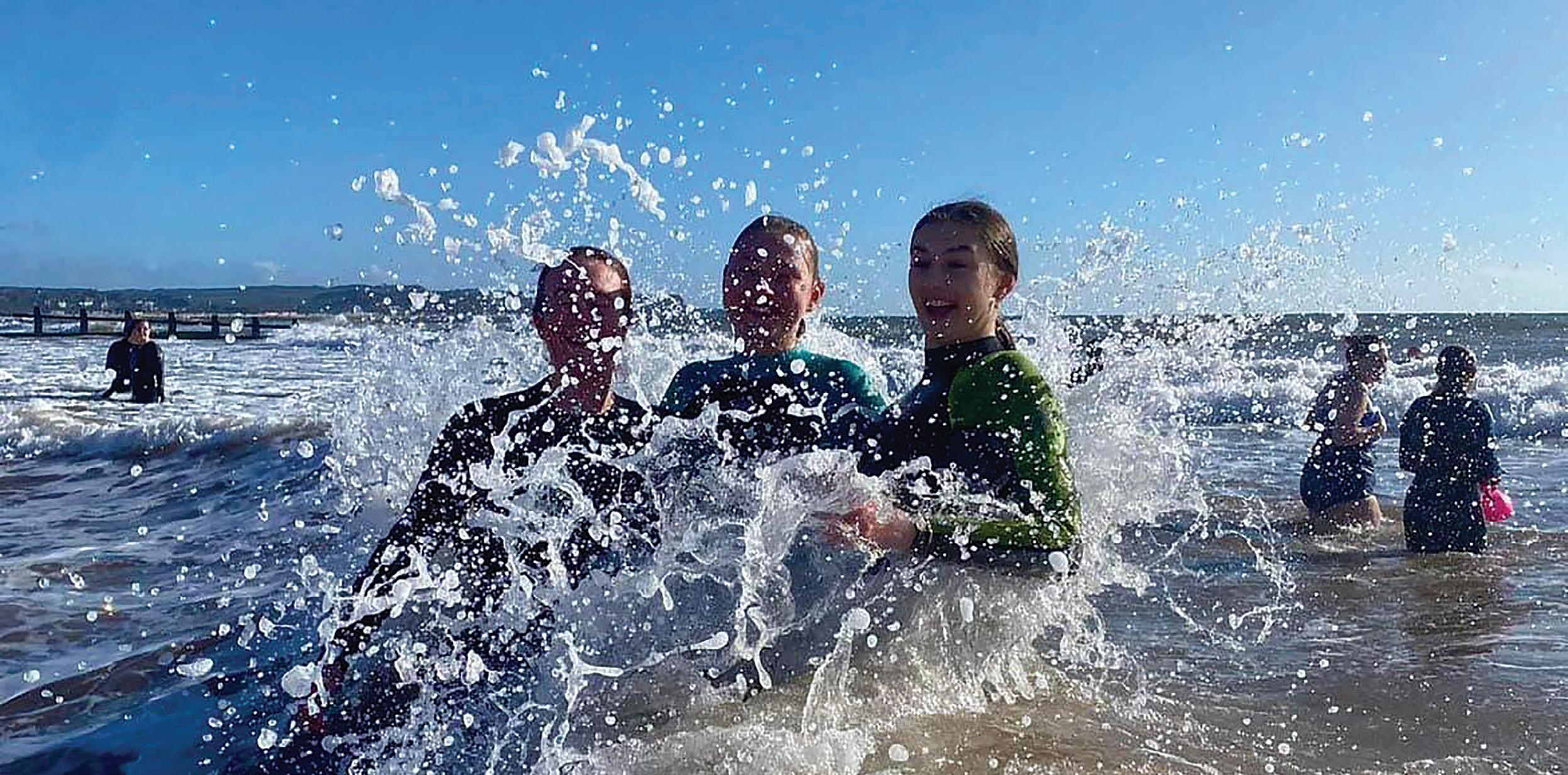 Anabel Costa-Ferreira Editor-in-Chief
Anabel Costa-Ferreira Editor-in-Chief
FOLLOWING intense criticism at the end of 2023, South West Water are once again being questioned over sewage pollution issues. Concerns across the Devon coast have arisen consistently across the news as South West Water continues to perform “significantly below target for pollution incidents for the twelfth year running.”
Accusations made against the utility company range from burst pipes to alleged illegal spills and sewage associated illnesses.
At a university so close to the sea, this is not only a feature that draws many students to apply but is also an important

part of many individuals’ weekly routines.
Exeter University Open Water Swimming Society (EUOWSS) has been incredibly impacted by these incidents, being forced to cancel several weekly swims due to poor water quality. Typically, weekly swims are held at Dawlish Warren, yet due to the sewage issues this location has frequently been changes and they’ve been unable to swim there no more than five times this entire academic year.
Speaking to committee members, they detailed further concern surrounding the impact this is having on students who use this activity as a way to cope with stress.
EUOWSS President Indra Sellars stated that “open water swimming is really beneficial for mental health” and the weekly nature of the event “encou-
rages people to make friends with like-minded students.” EUOWSS continued that “obviously swimming in the sea is free which makes it accessible to most people” and that following the “sewage dumping, we can’t swim and there’s not really any replacement.” Committee members shared with Exeposé that several students “depend on open water swimming to destress and a safe space to be after a stressful university week.” Therefore, any societies that rely on the closeness of the sea are left in both an impossible and incredibly frustrating situation.
The Guild echoed the importance of wellbeing opportunities, sharing that “our Give it a Go events often provide space and activities which can improve health and wellbeing.” As well as sign-
posting society events and sports programmes run by Exeter Sport such as the free ‘Pitch Up and Play’ programme.
Keeping an open dialogue with their members, after consecutive weeks of cancelled swims EUOWSS utilised social media to explain that they only cancel swims due to safety issues. These explanations also included maps and links to sites such as SAS.org.uk and Surfline. com which allow individuals to monitor pollution levels and risk across the UK.
The criticism of South West Water has also been raised often by the local Liberal Democrat party, who in previous months called for a CEO bonus ban within the water industry.
Continued on page 4
THIS ARTICLE CONTAINS CONTENT RELATING TO HOMOPHOBIA, SEXISM, RACISM AND XENOPHOBIA WHICH SOME READERS MAY FIND DISTRESSING
ON the 27th February the Exeter University Conservative Association (EUCA) attended their ninth ‘Port and Policy’ event of the year, which has since been accused of several concerning statements. An attendee
(who has requested anonymity) reported witnessing “serious xenophobia, misogyny, and blatant racism that was met with applause and cheers.”
While EUCA deny the claims, the witness, and their friend both shared with Exeposé that phones were confiscated at the start, viewing this as an indication what is spoken during the evening is knowingly wrong and would face criticism from the student body.
The event itself is reported to have used several vague debate titles to generate discussion and combined with alcohol resulted in many controversial statements. One anonymous attendee recounted
hearing a member make the racist remark, “all Asians look the same,” and noted that when given the chance to retract his statement, the individual refused. The event also included votes on emigration with troubling opinions expressed, such as, “I have no problem with Englishmen going abroad, but I do with people coming to England,” alongside derogatory jabs aimed at Russians, French, and Welsh individuals.
The structure of the debate itself seemed engineered to provoke controversy, with deliberately vague titles allowing for interpretations that catered to what has been de -
scribed as the “ladish nature” of the event. Highly misogynistic comments surfaced throughout the night, with one debate titled “This house would pay for it” leading to a disturbing argument against paying for abortions, which according to the anonymous witness, suggested instead that women should resort to using coat hangers if all other options were exhausted. Another debate, under the guise of discussing expansion, allegedly devolved into derogatory jokes about plus-sized women.
Editors
Print: Anabel Costa-Ferreira & Livvy Mason-Myhill
Online: Jamie Speka & Amelie Thompson
Print Deputies: Harry Craig, Charlie Gershinson & Joshua Smith
Online Deputies: Ewan Edwards & Megan Haynes editors@exepose.com
Executives
Finance: Willow Cracknell
Social Media: Charlotte Randall
Events: James Allen & Kritika Balhotra
Welfare: Destiny Walsh
News Editors
Print: Oliver Lamb
Online: Shagnick Bhattacharya & Anna Kane news@exepose.com
Features Editors
Print: Henry Parker & Benedict Thompson
Online: Michelle Chung & Callum Martin features@exepose.com
International Editors
Print: Josie Sharp
Online: Agata Koralewska
Comment Editors
Print: Lisette Reed & Charlotte Zeyssolff
Online: Charlie Oldroyd & Amy Rushton comment@exepose.com
Satire Editor Print Rosie Peters-McDonald
Lifestyle Editors
Print: Lucy Rawlings & Amberly Wright
Online: Emily Roughton & Zoe Sperry lifestyle@exepose.com
Arts + Lit Editors
Print: Maddie Conlan & Lauren Walsh
Online: Gracie Moore & Violet Berney artsandlit@exepose.com
Music Editors
Print: Jake Avery & Scarlett Cracknell
Online: Maya Fernandes & George Warburton music@exepose.com
Screen Editors
Print: Emily Sara Rizzo & Kayleigh Swart
Online: Jess Cadogan & Katie Matthews screen@exepose.com
Tech Editor
Print: Ewan Gregory & Charlie McCormack
Science Editors
Print: Eloise Shewring & Hannah Woodley
Online: Orla Watson sciandtech@exepose.com
Sport Editors
Print: Eloise Grainger, Oliver Rickwood & Ben Scott
Online: Mikhail Shklover & Ceri Vaughan-Jones





@exepose
@exepose
facebook.com/exepose issuu.com/exeposeexeter
AS we reach the final few weeks of term, it seems crazy how quickly these past few months have gone, and we are so excited to share with you the penultimate issue from this year's committee. Remember to keep an eye out for our upcoming AGMs and when the voting period opens (20th March).
In News this week, we reflect on the impact of the Covid-19 pandemic four years on (page 3). We also look at students dissatisfaction with catered accomodation at the University (page 6).
In Features , there's an analysis of the undemocratic elections (page 8 ), as well as page dedicated to exploring what is happening in the House of Commons ( page 9 ).
International discusses the rise in popularity of African fashion ( page 10 )
In Comment , there's an examination on the proposed ban on MPs from engaging with groups like Just Stop Oil ( page 12), as well as debate on whether men should be given a platform on International Women's Day ( page 13 ).
Meanwhile, Satire questions where Princess Kate has disappeared to ( page 14 ).
In Exhibit , Lifestyle elaborates on the best way to host a spring night in ( page 16 ). There is also a
RESTRICTIONS on international students have led to the number enrolling in UK universities falling by a third. Data shows that there has been a 33 per cent decrease in study visas issued compared to last year, as well as a 44 per cent decrease in international student enrolment in postgraduate courses., as reported by The Guardian
This is widely regarded as being due to the new restrictions on immigration visas from the government to bring down net migration. The reforms included banning postgraduate students on non-research courses from bringing their family to the UK, along with increasing the price of visas for all international students. The government has suggested that the dependent visa scheme has been abused in recent years, with 152,980 such visas being issued in the year ending September 2023 — a rise of 930 per cent on the 14,839 issued in the year ending September 2019.
commentary on how to embrace every opportunity after graduation( page 17 ). Arts and Lit shares a creative piece on the theme of water ( page 18 ) and writers recommend their favourite under-represented culture literature (page 19 ). Music takes a look at the rise of RAYE's popularity following her recent sweep at the Brit awards (page 21 ). Screen reviews the latest box office hit: Dune Part Two (page 23 ). Tech explains the government's plans to ban phones in schools ( page 25 ) and Exetera Exetera... shares advice on how to cope with the idea that university is coming to an end ( page 26 ).
Science studies the availability of abortion pills in America ( page 29 ) and Sport recounts Exeter City Women's match with Maidenhead ( page 30 ) alongside coverage of the two season openers of the F1 2024 season ( page 31 ).
We hope you enjoy reading this issue and want to say a huge thanks to all our contributors and proofers. We hope everyone enjoys the end of term and has a restful Easter break!

ARTS
Exhibition recommendation: Cristóbal
Balenciaga PAGE 18

ON 15th February, Zimbabwe’s Vice President, Constantino Chiwenga, announced a ban on scholarships for LGBTQ+ students and criticised the practice, leaving beneficiaries of this system in fear.
Homosexuality is illegal for males (with penalties of up to 14 years’ imprisonment) but legal for women. Same-sex marriage is illegal and the Zimbabwean government, under both Robert Mugabe and Emmerson Mnangagwa, has been outspoken against LGBTQ+ rights.
Chiwenga criticised the scholarship offers as “unlawful, un-Christian, un-Zimbabwean and un-African insidious attempts by foreign interests to entice, lure and recruit Zimbabwe’s less privileged but able students into Lesbian, Gay, Bisexual and Transgender activities and malpractices through offers of education scholarships.”

The
Despite concerns about net migration and abuses of the student visa system, reports suggest that international students boosted the British economy by £42 billion in 2022, with many UK universities reliant on international students for financial stability.
GALZ, an organisation that supports LGBTQ+ students between 18 and 35, stated: “the scholarship is intended to empower LGBTQ+ learners to serve and contribute powerfully and meaningfully to the realisation of rights for all.”
One student who has benefited from an LGBTQ+ scholarship said that “some of us have learned to live independently [thanks] to this scholarship. It has protected us from discrimination.”

Snowsports Exeter wore the crown at Kings
PAGE 32
THE Universities and College Union (UCU) has recently announced that Jo Grady is set to continue for another five years as General Secretary from Thursday 1st August. With only 15.1 per cent voter turnout, Grady seemed to be the safest option even against former UCU president Vicky Blake and KCL professor in Law Ewan McGaughey who narrowly lost the position.
Having been in seat through in dustrial strike action during her last term, Grady achieved further education’s biggest pay award in a decade alongside the greatest pension win in UK history and seems to promise this same pace and action in her next term in the role.

RGrady said: “under my leadership, UCU will continue to be a fighting union that will stand up for education. We need a fair funding settlement for higher education and binding national bargaining in further education. I look forward to working with our incredible members to push employers and government to invest in our sector’s staff and students”.
ISHI Sunak is facing calls to reverse a decision to allow Russian citizens to once again apply for the Chevening scholarship, a fully taxpayerfunded master’s degree. Russian students were barred from the scheme after the 2022 invasion of Ukraine, which is aimed at 'emerging leaders'. The scheme has been reopened to Russians amidst rising sanctions against their home country for the death of opposition leader Alexei Navalny. The scheme provides fully funded travel, accommodation, and tuition fees for non-UK students, on the condition that they return to their home country at the end. It is funded by the Foreign Office through the foreign aid budget and is an attempt to boost the UK’s soft power.
A Foreign Office spokesperson defended the decision by saying: “our argument is with Putin’s regime and his illegal invasion of Ukraine. It is not with the Russian people.”
Four years after first lockdown: Exeposé finds Covid-19 pandemic continues to impact studentsHarry Craig Deputy Editor
FOUR years on from the start of the Covid-19 pandemic, Exeposé has found that long-term impacts on educational performance, socialising and mental wellbeing have endured.
Today (20th March) marks four years since the start of the UK’s first national lockdown, and varying levels of restrictions continued for the subsequent 18 months, including a further two national lockdowns in November 2020 and January-March 2021.
The government launched the UK Covid-19 Inquiry in June 2022, which is expected to run until 2026, and is operating under a series of modules. The module ‘Education, children and young persons’ has been earmarked for discussion in the coming months, therefore the Inquiry has thus far said little regarding the impact of the Covid-19 pandemic on higher education and university students.
Nonetheless, the witness statements and evidence provided by politicians and civil servants ahead of this module suggests that the issue of higher education will likely be overshadowed by the more widely reported issues affecting primary and secondary education.
Wonkhe analysed a number of these statements last December, and found that Gavin Williamson, who was Education Secretary
until his dismissal in September 2021 following the GCSE and A-Level exam grading controversy, failed to mention universities at all in his statement.
Other statements similarly sideline higher education, with former Deputy Prime Minister Dominic Raab simply noting that, “I feel empathy for the university students who were paying for an education they were not receiving.”
Meanwhile, Former Deputy Chief Medical Officer Jennie Harries discussed the decisions and advice around university students returning for the 2020/21 academic year. Her evidence stated that, on 21st September 2020, the advice was to switch “all university and college teaching to be online unless face-toface teaching is absolutely essential.”
The majority of students currently at university would not have been in higher education during the Covid-19 lockdowns; instead, most were doing GCSEs and A-Levels. Nonetheless, a survey conducted by Exeposé has found concern that Exeter students’ educational performance has suffered because of the pandemic.
At the time, 61 per cent of university students reported that the pandemic had a major or significant impact on their academic performance in June 2021, according to the Office for National Statistics (ONS). This has endured, with numerous students raising the impact on their self-motivation with Exeposé, and that not sitting formal
GCSE and/or A-Level exams had had longer-term implications. However, there were also suggestions that the pandemic had improved teaching methods, as one student raised that "I think I have benefitted from the introduction of recorded lectures as a result of the pandemic.”
A majority of respondents felt that their long-term physical and/ or mental wellbeing had been impacted by the pandemic. Multiple students noted the impacts of long Covid, with one stating that, it had “caused me to lack so much motivation and have brain fog.”
However, respondents’ focus tended to be on the mental health impacts; one raised the issue of “pandemic skip” in which “I feel younger than my actual age and very frightened to have grown up too quickly”. Some also noted the enduring difficulty of transitioning out of lockdown, leaving one respondent to be “scared of socialising”, and another to argue that “I think most of us have some unresolved trauma from that time”.
This is unsurprising, given that the ONS found that 70 per cent of students reported a worsening in their mental health in January 2021, and the following month 31 per cent reported feeling lonely often or always, compared with eight per cent of the wider adult population.
However, most respondents to Exeposé ’s survey felt that there had been little long-term impact of the pandemic on their socialising habits. Although a few noted they

still feel anxious in large crowds and that they are more likely to reduce or stop socialising if they are ill, most felt that their social habits had returned to normal.
Some even felt that the pandemic had encouraged them to socialise more post-pandemic, with one noting that “I feel more social since the pandemic, it urged me to push myself where before I had been more anxious” and another stating that “I take more opportunities and go out as much as possible.”
When asked for comment, the University of Exeter said, “during the pandemic our priority was the safety and wellbeing of students. We were one of the first universities to launch a comprehensive funding scheme to support those in need due to Covid-19."
“We returned to in-person teaching as soon as regulations allowed, but we recognise the pandemic has brought about significant changes in the way people
work and interact. We have also been developing some online and flexible programmes specifically marketed at those who want to learn in this way."
"During the pandemic we worked to provide extra support for student mental health and we continue to invest in this area, including our new well-being centre, the new Pastoral Mentors pilot, and additional services, such as SilverCloud mental health support programme, and 24/7 online support via Togetherall."
Meanwhile, the Students’ Guild told Exeposé that, “as the Covid-19 pandemic unfolded, Guild staff and Officers supported our students in all ways possible in line with Government law.” This included “join[ing] the #EasetheFees and #StudentsDeserveBetter campaigns with the SU and NUS to campaign for tuition fee compensation during the pandemic, and ensure that your voices were still heard at local and national levels.”
STUDENTS and faculty members connected to the Institute for Arab and Islamic Studies have been accused of making alleged controversial comments in the wake of the 7th October terrorist attack on Israel by Hamas.
The Jewish Chronicle posted an article on the 13th March alleging that multiple students and lecturers connected to the Institute for Arab and Islamic Studies (IAIS) have praised Hamas in the aftermath of the 7th October terrorist attack against Israel. In a recording obtained by the Jewish Chronicle, the lecturer said that “if everything is fair in love and war should we be ok with rape but also what does it tell us, right, when do we insist about certain perpetrators and not focus enough on other perpetrators.” In another example, a student allegedly posted
their “congratulations” to Hamas on 7th October and suggested taking “35 hostages from there to Ghazzeh to show them around.”
A WhatsApp group chat was also unearthed which was reported to show messages with similar sentiments on the date of the 7th October such as one student who was alleged to have pledged their “full solidarity with Palestinian resistance” and another student who reportedly said “should we be expecting action for Izsoc [the University of Exeter Israeli and Zionist Society] soon?”
professor and UN Special Rapporteur for Palestine, Francesca Albanese, in October in which it is alleged that “Israel’s elimination” was discussed as well as a “genocidal campaign in Gaza, including questions of occupation, self-determination, selfdefence, ethnic cleansing, colonialism, and the role of third states [...] in the broader settler colonial context in Palestine.” There is no suggestion that they support terrorism.
always investigated thoroughly.
"The Institute of Arab and Islamic Studies is a wide-ranging and world-leading institute with the very highest academic standards, within the field of Arab, Middle Eastern, and Islamic Studies. It provides a comprehensive education in the culture, history, politics, economies, societies, and anthropology of the region. In line with the whole University, it promotes a culture of debate within the law, built on the principle of tolerance of different views and beliefs.
 Image: Charlie Gershinson
Image: Charlie Gershinson
After the 7th October attack, a senior IAIS professor appeared on Al-Jazeera saying that Hamas was “not a terrorist movement” but a “national liberation and resistance movement.” They have since said that they understand that Hamas is a proscribed terrorist organisation by the UK government but said, “I think it’s wrong as an expert.” There was an online seminar hosted by the
When asked for comment, a spokesperson for the University said, "the University is conducting a full investigation into reported comments made during an online seminar. The initial evidence from the recording suggests the academic was responding to a direct question and discussing the possible views of other feminists, and not her own, and expressing the view that all perpetrators of rape, whether in war or otherwise, should be dealt with equally. Serious allegations such as these are
"We are clear that there is absolutely no place or justification for any instances of discrimination, hate or harassment of any kind, but also actively promote free discussion and interrogation of challenging and sometimes controversial ideas, and ensure that our academic staff are able to undertake teaching and research without hindrance of their right to freedom of speech within the law."
THE University of Exeter is working to meet the requirements of the Student Mental Health Charter that was drawn up by the charity Student Minds.
The Charter aims to encourage a “whole-university approach” to mental health. It consists of 18 themes, each setting out a number of principles of good practice. If judged to have done well enough in relation to these principles, universities receive a Charter Award. 10 institutions have been so accredited.
Using the principles of practice as a yardstick, working groups will identify areas for improvement at the University of Exeter. The analysis will be complete in the
summer, whereupon a Charter Action Plan will be drawn up.
In-person drop-in sessions are being held from the 12th to the 27th March across the Streatham, St. Luke’s and Penryn campuses. Online workshops are also running between the 11th and 27th March. Students will be able to give feedback and ideas. The only remaining in-person dropin in Exeter takes place in Cross Keys on St. Luke’s campus from 1pm to 4pm on the 21st March.
Last term, a new wellbeing centre was opened on Streatham campus to provide more space for face-to-face appointments. Between the 2017-18 and 2021-22 academic years, the number of Exeter students contacting wellbeing services rose from 3044 to 7138. This echoes wider trends in universities. In 2020-21, over five per cent of students disclosed a mental health
condition to their university, nearly seven times more than in 2010-11. However, a confidential survey run by Student Minds in 2022 found that 57 per cent of students selfreported a mental health issue.
University Mental Health day fell on the 14th March.
A spokesperson for the University of Exeter said: “the Charter aims to support and encourage universities to achieve a whole-university approach to mental health and wellbeing. Achieving the principles outlined in the University Mental Health Charter framework will lead to improved mental health and wellbeing outcomes for staff and students, and a range of individual and organisationallevel outcomes. The University is committed to participating in the Charter Programme and applying for and achieving the University Mental Health Charter.”

“I have no problem with Englishmen going abroad, but I do with people coming to England”
THE event also faced criticism for its handling of topics around sexuality, with statements labelling homosexuality a sin being met with laughter and applause. Furthermore, some attendees noted a systemic overlooking of women when volunteering to speak, with seating arrangements that placed single women in the centre, allegedly reflecting a hierarchy of favouritism and exclusion.
As the evening progressed, the witness remarked that little was done to moderate excessive drinking, with some speakers being encouraged to take the floor precisely because their
intoxication was expected to lead to more controversial and, by some accounts, amusing statements.
When asked to comment on both how they would deal with problematic members and the reasoning as to why phones were confiscated at the event, a spokesperson for the Exeter University Conservative Association replied to the accusations stating that “EUCA does not tolerate any form of hate speech.” They continued that their “committee have not been made aware of any individual concerns raised by the members. They claim that the “alleged behaviour did not take place at an EUCA social or event”
and therefore felt no further need to comment on the accusations raised.
In response to the incident, A spokesperson for the University commented that while “We have not received any reports relating to the event, the University is clear that there is absolutely no place or justification for any instances of discrimination, hate or harassment and we are committed to ensuring our campuses are safe and welcoming for everyone within our community. We encourage anyone who may experience any such behaviour to report it immediately so it can be investigated through the appropriate channels."
Whilst the Guild confirmed
SPEAKING to our local candidate, Will Aczel, he shared with Exeposé that “the government’s weak and reckless approach to our environment is outrageous.” He went on to explain that “Since 2020, South West Water has dumped sewage for over 140,000 hours at designated bathing water sites. Enough is enough.” Aczel expressed further concern over the efficacy of the current regulations and the lack of fulfilled promises from the government dating to last April. Looking at how the Liberal Democrats would address the issue he stated that they would “demand tougher, legally binding targets on sewage discharges — especially for
bathing waters.” He also explained how in addition to banning bonuses, they would improve funding for the Environment Agency and Natural England and add “environmental champions” to the boards of water companies to ensure decisions remain in the interest of the greater public.
In response to concerns raised, South West Water’s Press office stated that while there are “a wide range of influences which affect water quality...we recognise that to improve the quality of our bathing waters we all need to play our part.”
While South West water don’t directly advise whether individuals can swim, they confirmed they do publish when bathing water quality is impacted
that the event was not directly arranged by EUCA, the event was promoted by the society through their social media. With regards to this, the Guild have stated that they "are aware that the event on 27th February was not hosted by EUCA, the event was part of a regular local community event programme that is advertised to EUCA members. We would encourage any students who witnessed this event or alleged harassment to speak to the Guild so that these allegations can be formally investigated." They continued by addressing that events are "organised by our registered societies and groups must adhere to our risk assessment
process and code of conduct." The Guild elaborated that they were concerned about this recent event where abusive comments were made and harassment occurred and that they believe that there is no place for hate in their community.
They then signposted that "we encourage anyone who has been the victim of harassment, abuse or assault to come forward to report it so we can take action and provide support. Reports can be made through the University’s Exeter Speaks Out web pages. If you have been affected in any way by abuse of any kind, you can access additional support and talk to the University’s Wellbeing Team in total confidence."
been able to swim for three weeks”
due to storm overflow activations. These overflows are described as “pressure relief valves” that function to prevent flooding and are also a combination of both sewage and surface water. While they allow locals to make their own informed decisions, alerts provided by apps such as Safer Seas and Rivers Service (SSRS) often warn against it directly.
As previously reported by Exeposé, the University established a recent connection with South West Water through the development of the Centre for Resilience in Environmnet, Water and Waste (CREWW) building. The cost of the centre is thought to have been funded by the University, the government
and South West Water. Despite the recent concerns highlighted by this connection, a spokesperson for the University states that they “are committed to leading meaningful action against the climate emergency and ecological crisis. We have a strong track record of using our research to secure significant change.” While the university also echoed the concerns of the public regarding pollution concerns, they assured that their association with SWW and work in the CREWW building aims solely to "protect drinking water supplies from pollution and ensuring the safe treatment and disposal of wastewater.”
Looking forward, South West Water also state that they
will “continue to work closely with local stakeholders and partners on improvements to the environment.” Yet for EUOWSS and Devon residents, the compilation of promises is yet to be met by any legal or visible action.

that “we were harassed and abused”.
This included accusations that one individual attempted to throw fruit squash over the Israeli flag, and that the leaflets being handed out by the Society were ripped up in front of them.
ASTALL in the Forum run by the Israeli and Zionist Society has attracted national headlines, after it was met with significant on-campus backlash.
On the 6th March, the Society held their first on-campus stall since the Hamas attacks on the 7th October, in which according to the BBC over 1,000 Israelis were killed and hundreds of civilians taken hostage by Hamas, which is designated as a terrorist organisation by the UK, US and EU.
This led to the ongoing IsraelHamas war, as Israel launched a siege on the Gaza Strip. This has killed over 30,000 Gazans, and almost all of Gaza’s 2.3 million population have been displaced, according to the BBC. In January, the UN’s International Court of Justice made an historic ruling, ordering Israel to ensure its forces do not commit acts of genocide in Gaza.
This conflict has led to a surge in antisemitism and Islamophobia in the UK. In February, the Community Security Trust reported a 589 per cent increase in antisemitic incidents since the 7th October versus the same period in 2022, whilst the Islamophobia Response Unit reported that Islamophobic incidents had increased by 365 per cent since October earlier this month.
In response to the stall, a large crowd of around 100 students gathered in the Forum. The Society accused some of being abusive towards them, with one student who was part of the group manning the stall alleging to the Jewish Chronicle
These incidents were reported in the national press, including by the Mail Online, GB News and the Jewish Chronicle. These outlets alleged that this stall was raising awareness of antisemitism, although many students have raised issues regarding these claims, with the leaflets being distributed by the Society focusing on the actions of the Israeli government, rather than issues of antisemitism. Of the five leaflets being distributed, only one made reference to antisemitism, discussing the International Holocaust Remembrance Alliance's (IHRA) definition of antisemitism.
The leaflets handed out by the Society were promoting the work of the UK university-based wing of the Committee for Accuracy in Middle Eastern Reporting and Analysis (CAMERA), a controversial organisation which claims to “promote accurate and balanced coverage in the British media, and train students to effectively educate others about historical and current issues in Israel.” It is a self-claimed “media-monitoring” organisation.
CAMERA, which is mostly run by Americans based in Boston, frequently engages in attacks on those who are either anti-Israel, or not pro-Israel enough, with criticisms spanning across both Israelis and nonIsraelis, according to The Guardian
One of the leaflets which attracted the most controversy was one which claimed that Israel is the “most LGBTQ progressive nation in North Africa and the Middle East”, with many claiming that this was “rainbow-washing” the current deadly conflict the Israeli
state is currently engaged in in Gaza.
Another leaflet documented why Israel is targeting six Palestinian non-governmental organisations (NGOs). The organisations are all part of the Popular Front for the Liberation of Palestine (PFLP), an organisation classed by some to be a terror front. One of the NGOs is Al-Haq, which is part of a network of human rights organisations and unions which have condemned the ongoing Israeli assault. The Society also distributed a leaflet entitled "Israel's siege on Gaza explained".
In response to this incident, the Israeli and Zionist Society told Exeposé: “what happened on the 6th March in the Forum was an example of how Jewish voices are attempted to be silenced by those who can’t accept an alternative viewpoint to theirs.”
“Attempting to stop another person or group’s freedom of speech just because you may not agree with them is an example of nothing but being afraid of the facts. Gathering in mobs and trying to silence and abuse others by throwing and ripping things will never be the right way to approach anything – whether this was done to us or the other side it is wrong.”
“Finally abusing and harassing a group of Jewish students will not do anything for the Palestinian people and if groups on campus think it will then they can only be seen as one thing: antisemitic.”
Exeposé also contacted the Friends of Palestine Society for comment on the stall, as well as the Jewish and Islamic Societies for comment on the general rise in both antisemitism and Islamophobia since October, but did not receive a response from any of them at the time of publication.
Exeposé spoke to some of those who gathered to express their dissatisfaction with the stall. One student stated that “it can be very triggering for students and members of the community who feel very strongly and who have been attacked by Israeli occupation forces.”


health, because what has happened today is a student who has lost family in Gaza has reacted in a negative way because of the celebration of the Israeli genocide of Palestinians.”
“It's an indictment of the University’s policies, allowing it to go ahead after a risk assessment, which should have prevented anything like this, especially right now, is obscene. It's ridiculous… the information being handed out is fundamentally incorrect.”
investigation, we are reviewing the full CCTV footage that is available.”
They continued, “obviously there’s this idea that… we need to have this scholarly debate. I don’t think that’s necessarily possible when people’s families are being killed and they’re not being recognised by the University’s administration.”
Another student told Exeposé that they believed “it is ridiculous to think that Zionism… should be allowed to have a society on campus. It’s not reconcilable with looking after students’ mental
Moreover, in an article written for The Palestine Chronicle in February 2023 regarding the creation of the Israeli and Zionist Society at the University, Exeter professor Ilan Pappé wrote that the creation of the Society “is not meant to educate students or faculty about Zionism; these are just acts of intimidation meant to undermine the successful solidification in the University of Exeter of a fine and professional program of Palestine Studies.”
In response to the incident, a spokesperson for the University of Exeter said: “We can confirm we are investigating a report of an incident that took place on our campus. We are meeting with those involved to ensure they are receiving the appropriate support.”
“University security was present throughout and members of the police, who were present at the University as part of a separate meeting, visited the stall before the incident occurred. As part of our
“The welfare and safety of all our students is our highest priority. The University is clear that there is absolutely no place or justification for any instances of discrimination, hate or harassment and we are committed to ensuring our campuses are safe and welcoming for everyone within our community. We encourage anyone who may experience any such behaviour to report it immediately, and we will continue to offer and provide welfare support for those involved.”
The University was asked whether this stall went through the regular channels of compliance or raised as an Event of Concern, as per its event approval process, but did not comment on this.
The Students’ Guild also responded by stating: “we facilitate groups with a wide variety of views under freedom of speech within the law. All of our registered societies have the right to express their views providing they are not unlawful. We are offering resources and guidance to students on how societies and student groups can talk about Israel and Palestine whilst avoiding antisemitism and Islamophobia.”
The Guild also urged anyone who has experienced or witnessed any form of abuse to report this via the Exeter Speaks Out tool, and to contact Wellbeing Services for support and guidance if anyone is distressed by the issues raised in this article.
LAST month Plymouth faced what the Ministry of Defence described as "one of the largest UK peacetime evacuation operations." A 500kg World War II bomb was unearthed by a resident digging out the foundations of his garden in St Michaels Avenue in the Keyham area.
Police were called to the site on Tuesday 20th February, and on the Friday experts launched a highly complex disposal operation
to transport the device in a military convoy through the city.
More than 100 personnel from the Royal Navy and British Army came together to tackle the issue, as well as Plymouth City Council officials and fire rescue services.
During the operation over 10,000 people were forced to evacuate the area of Keyham. At 17:30, residents were finally informed they could return to their homes. At 21:51, the German bomb was successfully detonated at sea.
Defence Secretary Grant Shapps commended the personnel for their "bravery and
fortitude", and the members of the public for their outstanding "patience and cooperation."
Tudor Evans, Plymouth City Council leader, also commented:
“I think it is fair to say that the last few days will go down in history for Plymouth. This wartime bomb has really brought out wartime spirit, people coming together to really support each other, and whilst it has been really tough — we got through it.”
In 2021, student halls on Exeter's Streatham Campus were damaged after a World War II bomb was detonated nearby.
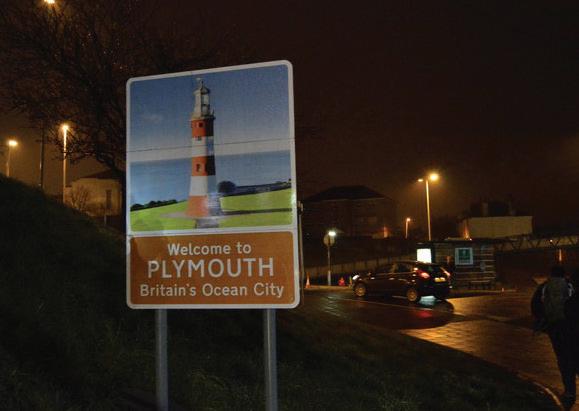
 Livvy Mason-Myhill Editor-in-Chief
Livvy Mason-Myhill Editor-in-Chief
ANEW Popeyes restaurant officially opened on Monday 18th March at 11am. The Popeyes fast-food chain is famously known for its chicken sandwich that received 3.3 billion tweets when it was launched in the US. The restaurant gave out 25 chicken sandwiches to the first 25 customers in the queue and the first three people in the queue received a year’s worth of free chicken sandwiches. This restaurant is
their 42nd location to open in the UK.

This restaurant is their 42nd location to open in the UK
Their menu includes its 12-hour marinated chicken, including hot wings and tenders, as well as original southern biscuits and gravy and cajun rice. The opening of the store was also accompanied by a brass band, ‘The Brass Funkeys’, which welcomed customers as they entered. Their breakfast menu was then launched on the 19th March, which
features British Breakfast classics with a New Orleans twist, such as the big cajun breakfast roll, cajun hash browns and indulgent nutella-topped buttermilk biscuits.
Tom Crowley, the CEO of Popeyes, stated that “we are incredibly excited to be bringing a taste of New Orleans to Exeter. We’ve wanted to land in the Southwest since we landed in the UK, and Exeter was an obvious location for us to do that. After the success of our Plymouth restaurant opening last year, we’re confident Exeter will be just as popular and can’t wait to bring our famous Louisiana chicken to the heart of the city.”
STUDENTS staying in on-campus catered accommodation have raised concerns about the quality of the food provided, as it comes to light that the University of Exeter’s primary food supplier used a food processing firm which has been embroiled in a food safety scandal.
Bidfood, which is one of the UK’s largest food wholesalers, was found by Farmers Weekly in 2023 to be using a food processing company which was engaged in a mass industrial fraud over the origin of its produce. The company, which cannot be named for legal reasons, was found to have passed off up to tens of thousands of tonnes of foreign pork as British per week. As well as Bidfood, the company also supplied Sainsbury’s, Subway and food manufacturer and distributer Oscar Mayer.
The processor was accused by former employees of “washing” hams which were visibly off, mixing rotting pork with fresh produce, and allowing frozen products to thaw on the factory floor, all of which pose safety risks. When one whistleblower confronted their superior about these conditions, they were told “do you want the effing job? Get back in there.”
The University of Exeter’s contract with Bidfood has raised concerns about the quality and reliability of food provided to students living in catered accommoda-
tion. The six halls which provide catered accommodation offer a much higher rent than self-catered equivalents. The average weekly cost of self-catered accommodation for the 2024/25 academic year is £183.83 while the equivalent cost for catered accommodation is £262.88, a difference of 43 per cent. This represents a 22 per cent increase in catered accommodation from the 2023/24 academic year. In information previously obtained by Exeposé, demand for catered accommodation has declined substantially in recent years, decreasing by 20 per cent from 2019-2023.
Students’ attitudes to the food in catered accommodation has been known to be mixed over the year. An Instagram account called “Holland Hall Desserts” posted several pictures of desserts served in the Holland Hall accommodation which were described as “below average.” In a survey conducted by Exeposé, students noted a range of opinions on the food served at catered accommodations. One student said that there were “very small portions… I’m already underweight but I always found myself hungry later in the evening. This is far too much money especially when considering lunch is only included on weekends. The only thing we have in the accommodation is a microwave and kettle.” Another student commented on the lack of variety of food, saying the options “mainly consist of turkey or pork.”
Other students discussed the presence of global cuisine nights. One student said, “on the surface, global cuisine nights once a week sound like a good idea, yet, when the basics are already struggling to be ex-
ecuted, I don’t think these global cuisine nights are a good idea.” Another student said, “the night I moved in was taste of Mongolia so not the most welcoming.” However, other students were positive about their experience of food in catered accommodation. They were particularly positive about the staff working at the canteen, describing them as “really good” and “extremely kind people.” Another student was positive about the vegetarian options, saying it was “good for vegetarians overall.” One student theorised that any issues laid with “management, suppliers, etc.”
The University of Exeter’s website states that “where possible, we look to use the finest local produce and the most ethical and sustainable supplies”. The University’s Sustainable Food Policy states the “adoption of two vegetarian and whole foods suppliers” and monitoring “supplier compliance against the Sustainable Food Policy.”
“When approached for comment, a spokesperson for the University said, “The University provides varied and nutritious food options for all dietary needs across our catered residences. The menu operates on a four-week cycle to ensure we offer an innovative menu full of variety and well-known favourite meals. We also continue to offer a weekly themed night where we create and develop dishes from around the world.
“We are proud to be serving food using fresh ingredients to ensure nutritious meals. We have worked hard to ensure that we source a large amount of regional produce, including our full meat supply which is from within the South West. Fresh fruit is available at each meal
service and a salad bar is also available at brunch and dinner service. Our grounds team have been busy growing seasonal fruit and vegetables on site for us to use within our menus. This project is supporting our aspiration to reduce the travel miles and our overall carbon footprint. All of our food offerings have standard recipes written and these standard operating procedures are followed in each hall of residence to ensure that quality and consistency are delivered across the three areas.
“We have also introduced a new initiative within the last year – a Students Insights Group. This forum provides students the opportunity to feedback to us their experiences on a range of topics and be involved in some of our projects and current initiatives. This has allowed us to continuously improve our offer and give the best student experience.
“We can also confirm that there has been no reduction in food spend or allowance per student within the fully catered package.”
Image: Univresity of Exeter

GUILD Officers held a campaign meeting to relaunch the Shell Out campaign last week, amidst continuing student concern over the University’s partnership with oil giant Shell.
On the 11th March, Guild President Emma de Saram hosted the meeting entitled “What the Shell are we going to do?” in the Greenhouse in Devonshire House, alongside the four other Guild Officers. This aimed to encourage students to find out more about Shell Out, and general student-led sustainability and environmental campaigns.
The meeting was attended by a number of students and members of staff, including Dr. James Dyke, Associate Professor in Earth System Science at the University’s geography department.
It was also attended by the organisers of the University Assembly, which is being held today (20th March) by the Global Systems Institute. This is centred
around the question, “If you were in charge of the University, what would you do?”, and is taking place in the Newman Red Lecture Theatre from 14:00 to 16:00.
The Shell Out campaign was launched in December 2022, in response to the University’s announcement of a research partnership with the company the previous month, focused on carbon sequestration.
Shell Out presented an open letter to the University in February arguing that the sequestration technology was “unproven” and that they are intended to allow to Shell to continue using fossil fuels.
As previously reported in Exeposé (Issue 744), the group launched a protest outside the Forum in March 2023 in which they presented 300 signatures, including from societies such as the Feminist Society, Be the Change and Socialist Students.
The sequestration technology, on which the University and Shell are collaborating, is based on the Carbon Storage in Pasture through Ecological Restoration programme (CASPER). Seven researchers
from the University’s Geography department have been working on the project since 2022. Their research concerns the identification of the mechanisms that can promote carbon sequestration in agricultural soils and identifying solutions to increase productivity and soil carbon storage in degraded Brazilian pasture systems using native plants.
The talk held by the Guild Officers also raised the statistic that the University of Exeter was the largest beneficiary of fossil fuel financial commitments of any university in the UK. They have received £14.7 million since 2022 (all coming from Shell), and more than double the nextlargest beneficiary (Imperial College London, £6.7 million).
On the 12th March, as part of a module for their Communications degree, a number of students held stalls in the Forum on a range of social justice issues. Two students chose to focus on the Shell Out campaign, and told Exeposé that they had been inspired by the protest in the Forum last October by Just Stop Oil activist George
Simonson, which “got us thinking about something that is happening within our own University”.
One of the students continued by stating that, “I personally think the partnership goes against the University’s sustainability pledge.”
Reacting to the relaunch of the Shell Out campaign last week, the Students’ Guild told Exeposé : “we want to encourage students to use their voice to create change locally and nationally, and to help students achieve this, we’re currently working on our very own Campaigns Hub. This hub will be full of resources, information and support for students interested in working on projects and campaigns.
“Sustainability is important to us, and we know it's of big importance to so many students too. On 11th March, the five Full-Time Officers hosted “What the Shell are we going to
do?” which was a campaign meeting for students to find out more about the student-led Shell Out campaign.”
“We are also continuing to support climate-focused student groups and societies with events, campaigns and protests by assisting them to operate in a safe and secure way.”
Exeposé also contacted the University regarding both the Shell Out campaign and the People’s Assembly event, but did not receive a response.


FEATURES EDITORS: Benedict Thompson Henry Parker
Authoritarian regimes are uprooting increasing numbers of student journalists. Benedict Thompson, Features Editor, analyses the threat to student journalism around the world
BEING a student journalist under persecution is its own punishment. But for Afghan student journalist Sayed Pervez Kambaksh, as arms were drawn in the Afghanistan War, it was the only weapon available to raise awareness for those who remain in authoritarian regimes.
After working as a student journalist while studying at Balkh University in 2007, in the north of Afghanistan, Sayed Pervez Kambaksh began to notice he was no longer alone on Balkh’s streets. Gradually, his reporting of a lack of women’s rights in Afghanistan was replaced by full-blown harassment, with local authorities following him. He was under surveillance and was eventually arrested and sentenced to death in 2007 “for blasphemy”. Having carried out various reporting on women’s rights, Kambaksh’s arrest is a reminder that if you stand against an authoritarian regime, they do not want you there.
Kambaksh is just one of many student journalists who have felt a duty to the people they have left. In recent years, the world has seen a sharp decline in student journalistic safety, from
UNDEMOCRATIC elections
stand as the textbook way for authoritarian rulers to maintain power. They serve as tools to veil their corruption with the guise of democracy — processes that not only provide their office with supposed credibility, but also ones that ensure they hold an iron grip over government. The performative aspect to holding such elections bears multiple benefits.
Firstly, they allow dictators to size up their political opponents, allowing them to gain further insight into their political strategies, manifestos, and the strength of the public support they receive whilst campaigning. Conversely, elections allow authoritarian rulers to intimidate their rivals, flexing the potency of their support whilst also drawing out potential obstacles to their premiership due to the likelihood of protests, riots and critical discourse from the disenfranchised. The occurrence of these acts provides further legitimacy to the punishment and potential imprisonment of protestors, snuffing out the flame of any kind of revolt whilst also making an example of defectors to their regime.
Whilst these elections superficially may appear to be legitimate, there are often ways that authoritarian leaders try to circumvent losing their authority through
Afghanistan and Russia, to Iran and Indonesia. Student journalists are everywhere. In 2022, Reporters Without Borders (RSF) found that a record 533 journalists were imprisoned worldwide.
For student journalists, there is no exception. In the same year, The Indonesian Student Press Association’s reported that there were 185 “repressions” against student journalists and media outlets in their country in the space of 12 months.
Last year, student journalists in Indonesia said they were being targeted with expulsion, physical assault and death threats after writing about sexual harrassment. In 2023, in Iran, Kurdish student journalist Mahsa Amini was arrested for writing an article on opposing mandatory hijab. Amini died in police custody under suspicious circumstances.
A double-edged sword of sorts, living in this journalistic purgatory takes a toll on student journalists. But, it also means journalists around the world are even more mo-
tivated to keep going for those who could not. In 2008, The Independent led a campaign to secure justice for Kambaksh the day after he was condemned to death in January 2008. By May 2008, 100,000 people had signed the petition calling for Kambaksh’s release. Five months later the death sentence was quashed and Kambaksh was freed from prison in 2009. The Independent has since learned that he is now living outside the country.
Speaking to the journalists who
spearheaded this campaign, one told me, “I had this fire in my belly that this struck me as a horrific justice. That a student journalist who felt not that dissimilar to me at that age should be jailed and accused of blasphemy.” He continued, “We did what journalists do. We just drew attention to things. Transparency can be a fantastic antiseptic. It can create momentum, and it worked for Kambaksh”.
There was hope in Afghanistan in the 2000s that liberal reforms would
be introduced. But equally, it remains a very conservative country, even more so after the recent Taliban takeover and regime change. There was still a sense of optimism, although that optimism has now ended. However, Kambaksh’s case serves as a useful reminder of the power of journalism to campaign and fight for other studen journalists around the world. They too, continue to face tough restrictions on reporting in their home countries.
Image: Defense Visual Distribution Service, PICRYL

apparently legal methods. The dictator of Nicaragua Daniel Ortega serves as an infamous example of this; in 2009, when his second and final term was reaching its end, he argued to the Nicaraguan Supreme Court that having term limits was an injury to his fundamental human rights. The Court, most likely due to its justices being his accomplices, agreed, granting him the opportunity to ‘run’ for an unprecedented third term in office. He is still the president of Nicaragua today. Putin also achieved the same amendment, constructing constitutional changes after his 2018 re-election that allow him to serve until 2036. Despite the blatantly authoritarian manner by which these changes are executed, there is always a legal and formal backing at hand to provide dictators with the credibility they need to justify their further claims to power.

The blatantly authoritarian manner by which these changes are executed”
Marking the inevitable acquisition of Vladimir Putin’s fifth term in office at the time of writing is Russia’s election. Any opposition to Putin has either been exiled abroad, disappeared from politics alto-
gether or, as in Illya Yashin and former opposition Alexi Navalny’s case, imprisoned.

to Putin has been exiled abroad
The recent death of Navalny marks the continuation of this cycle. Also unsurprising is Putin’s ability to put on political theatre in order to mask the predictability of the upcoming election.
When asked before at a public event memorialising Russian soldiers if he’d run for the post of president again, he responded with uncertainty, declaring that he would have to consider it due to having “different thoughts at different times,” a statement deployed to try and obscure the fact that it’s already decided. Despite this, the upcoming election will serve as a valuable tool for Putin, allowing
him to reassert his control and signal the strength of his premiership at a time when doubt around Russia’s future lurks. This is due to a litany of reasons, most notably the ongoing fallout after Navalny’s death, as well as other questionable events such as Prigozhin’s failed coup last summer. There was speculation leading up to the election as to whether Putin would feature an anti-war candidate in order to quash any criticism of Russia’s war whilst also playing to the side of free speech.
Image: Michał Siergiejevicz, Wikimedia CommmonsHowever, this has not been the case. Boris Nadezhdin, a liberal politician, made his opposition against the war a staple of his campaign, and despite widespread support to feature him on the ballot, the majority of signatures were cast as invalid. With the three other candidates broadly supporting Kremlin policy and the war on Ukraine, Putin is leaving no room for opposition support to spark. His reign over Russia will continue.

ON the 6th March, Chancellor of the Exchequer Jeremy Hunt delivered the government’s spring budget, the last one before the next general election, which must take place by January 2025.
The big news is the 2p cut to National Insurance, which comes on top of a cut of 2p made in the Autumn budget. According to Hunt, this will be worth £450 a year to some-
one with a salary of £35,000. However, a think tank called The Institute for Fiscal Studies says that those earning under £25,000 a year will be worse off than previously due to the cuts to National Insurance and tax threshold freezes. Furthermore, it has also been said that inequalities could worsen, as many people who earn under this amount rely more on public services that are funded by taxes, which will potentially suf -

Tfer under the new budget. According to the Institute for Fiscal Studies, those earning between £26,000 and £60,000 a year will benefit from the cut to National Insurance, and to those earning over £60,000 there will be little to no difference.

Those earning under £25,000 a year will be worse off than previously
Another interesting development is Hunt’s decision to abolish non-domiciled (non-dom) tax status. A non-dom is someone who lives in the UK but does not pay tax on their overseas income, and an estimated 70,000 foreign nationals living in the UK benefit from the existing rules, including Prime Minister Rishi Sunak’s wife, Akshata Murty. The current system will be replaced in April 2025 by a “modern, simpler and fairer” system where new arrivals will only be able to not pay tax on overseas income for four years.
Hunt also announced that there will be a new tax on vaping products, to try and discourage children from vaping. This tax will be introduced in October 2026 and will reflect the level of nicotine in the product in question. However, to ensure that vaping remains cheaper than smoking, tobacco duty will be raised to £2 per 100 cigarettes.
Furthermore, the windfall tax on energy companies and their profits, which was meant to end in March 2028, has now been extended and will continue until 2029, in a move that not all
Tory MPs are happy with. Eligibility for child benefits has also been extended and benefits will soon be available to people earning up to £60,000 instead of £50,000, meaning around 170,000 families will now be eligible. Spending on public services will stick to the plan of one per cent above inflation every year until 2029. However, this means that some areas of public services such as local government and justice will likely suffer budget cuts, as others, like the NHS and schools, have protected budgets that can’t be cut (although these public services with protected budgets are already struggling).

Local government and justice will likely suffer budget cuts
Many of the decisions outlined in Jeremy Hunt’s budget reflect the fact that this is the last budget that will take place before the next general election, and the Conservatives are attempting to curry favour from voters. For example, the decision to extend windfall tax, as well as abolish non-dom status, emulates fiscal policies previously outlined by Labour. These policies also mark how Hunt plans to recover revenue that will be lost by the cut to National Insurance. Sir Keir Starmer, leader of the Labour Party, said Chancellor Jeremy Hunt is trying to “give with one hand, take even more with the other”.
Rickwood, Sport Editor, analyses Galloway’s return to Parliament after a controversial by-election
HE by-election in Rochdale was triggered by the death of Labour MP Sir Tony Lloyd in January of this year, and in the current political climate, it was clear fairly early on that this contest would be dominated by the ongoing Israel-Hamas war and a stance on potential ceasefires, as called upon by the Labour Party in recent weeks. Candidates had to win over the large proportion of Muslim voters to have a chance of winning.
The Labour Party were immersed in controversy weeks before the by-election date, as their nominated candidate Azhar Ali was suspended due to antisemitic comments claiming that Israel were complicit in the 7th October attacks. These attacks took the lives of around 1,200 people and led to the capture of around 200 more by Hamas militants. Under electoral law it was too late to replace Ali, so he would still stand, but unsupported by his party. He went on to poll a mere 7.7 per cent.
This cleared the way for George Galloway’s parliamentary return, capitalising on the disgraced Labour politician’s remarks, fuelling his anti-war and pro-ceasefire message upon which he founded his campaign.
Galloway is somewhat of a maverick of leftwing populism, having retuned to parliament in a similar fashion before, winning a 2004 by-election seat in an East London area with a large Muslim population for the anti-war Respect Party. His campaign then was centred around Britain’s involvement in the Iraq War, calling the Labour government that he was expelled from “Tony Blair’s lie machine” and encouraging British troops fight-
ing in the Middle East to disobey their orders.

Galloway is not free from controversy himself. He was previously accused of racism in 2013 when he refused to answer to an Israeli citizen in an Oxford University debate, saying “I don’t debate with Israelis.” He was also sacked by TalkRadio in 2019 following comments after the Champions League Final in which Tottenham Hotspur lost. He tweeted “No Israel flags on the cup!”
A potential for antisemitic rhetoric to creep into this election campaign worried Westminster, as Galloway whipped up support attending protests and making loud, accusatory speeches, holding both the Prime Minister Rishi Sunak and Labour leader Keir Starmer responsible for a lack of peaceful action in Palestine. After his win, Galloway described the pair in typical metaphor, as “two cheeks of the same backside.”
“Keir Starmer, this is for Gaza,” he said. “You have paid, and you will pay, a high price for the role that you have played in enabling, encouraging and covering for the catastrophe presently going on in occupied Palestine in the Gaza Strip.” Galloway promises to stand as many as 90 Workers’ Party candidates in the upcoming general election, looking to team up with independents, hoping to cause Starmer a real headache. “It is our intention to replace Labour.”
The Labour leader should not be alarmed however, as piggybacking off the success of Gal-
loway and replicating his by-election victory on a national scale will be extremely tricky. It is likely that the timing and turbulent conditions of the Rochdale by-election fell perfectly, but the potential to upset and take chunks out of Labour, especially in the north, should not be ruled out.

The Prime Minister called the result “beyond alarming,” noting the rise of left-wing extremism. He said the Workers’ Party “dismisses the horror
of what happened on the 7th October.” Galloway’s win places more pressure on the government to reassess their stance on a potential ceasefire in Gaza.
The Tories were down by 19 points after Rochdale, but a slump for Reform UK will come as a comfort after their gains in recent Wellingborough and Kingswood by-elections.
In the coming months, Galloway will continue to call for a ceasefire in Gaza whilst gearing up his candidates to run for the upcoming general election. As it fast approaches, the magnitude of what he calls the “shifting of tectonic plates” will become apparent for not only the Labour Party, but the entire state of British politics.

Amelia Shore-Nye discusses the rise of African fashion’s popularity
SOUTH African designer Laduma Ngxokolo describes “African luxury fashion [as] a very lonely space to operate in.” The articulation of isolation amongst fashion designers of the African diaspora is well-recorded. Ngxokolo’s sentiments are reflective of a historic under-representation of African designers at major fashion houses, and on the runway.
But this season, like the last, showed that the appetite for African fashion is growing. As we round off the ‘big four’ fashion weeks’ fall/winter 2024 showings, there are considerable nods to African designers, patterns and textiles. Affirming the promising trends, a UNESCO forecast commenting on the potential of Africa to “become one of the next world fashion leaders.”
Cameroon’s Imane Ayissi stunned with his ‘Abeung Sanda lyé’ Spring-Summer 2024 presentation, a nod to the draping of loincloth adorned by women on the continent. British-Nigerian Tolu Coker has also emerged as a fashion victor, being featured on the cover of British Vogue for her contributions towards sustainability and her refugee advocacy.
UNESCO realises the potential for a strong luxury goods market to open up on the continent thanks to a burgeoning African middle class. Appreciation of traditional artisans and their crafts are solidifying the positions of diasporan designers in New York, London, Milan and Paris. Among those applauding African designers, musical tal-

ent ‘Beyoncé’s support for MaXhosa builds on the accreditation in Vogue cover stories, and LVMH emerging talent awards, all signs that African design is poised to change the face of western fashion.
Pre-meditated presidential murder
Gracie Moore, Online Arts and Lit Editor, investigates the death of an Ecuadorian presidential candidate
IN August 2023, Ecuadorean presidential candidate, Fernando Villavicencio was shot dead as he was leaving a campaign rally in Quito just days before the election was set to take place.
Prosecutors have newly announced that they believe his assassination was planned from jail and six suspects have been charged in connection with the murder. Of these subjects, five are Ecuadorean nationals and one is Colombian.
During his campaign, he had denounced gangs and pledged to tackle them if elected. Also, he based much of his campaign on the growing corruption in Ecuador, violence in the country and environmental protection. Calling Ecuador, a “Narco” state, this wasn’t always particularly well-received by members of gangs, which run rife in Ecuador.
Despite receiving death threats and requiring being given a security detail, his campaign continued in the wake of this, and it reached a head when Villavicencio was gunned down outside a school in the North of Quito.
On Tuesday the 27th February, there was a court hearing in Ecuador in which prosecutor Ana Hidalgo described how the investigation unfolded. She explained that there is CCTV footage which appears to show the gunman who fired the fatal shot at Vil -
lavicencio and in this footage, he is himself killed in a shoot-out with police after the assassination.
Six Colombian suspects were arrested at the time but weeks later, found dead in jail along with a seventh suspect in another prison after they had allegedly been hanged. It is now believed that these men were hired gunmen and had been ordered to kill the politician.
Police are cognisant of Los Lobos criminal gang who police believe provided support to the assailants. This gang has around 8,000 members and is one of the most powerful criminal organisations in Ecuador. The investigation into the exact source of the instruction to murder Villavicencio is ongoing.
Due to an explosion in gang violence in Ecuador recently, President Daniel Noboa has declared a state of emergency.

AS Taylor Swift is on her Eras World Tour, her flight paths have drawn serious attention, and more specifically how often she is flying. With a growing focus on climate change, it is with growing disappointment that we see such a high use of CO2 emissions from the singer, whilst we re-use metal straws and our pa per bags melt away in the rain. Celebrities using private jets is disrespectful towards those who are environmentally conscious. To consider the influence that celebrities have in shaping people’s actions, it is crucial to question celebrities en vironmental footprints. The MyClimate Car bon Tracker recorded the top celebrities creating the most CO2 emis -

sions in February 2024, and Taylor Swift is not listed. Noticeable names include Travis Scott, Kim Kardashian, and Beyoncé. Is it simply because we see Taylor in the public eye so much that our attention is on her? If anything, it would be excusable as her travel is for business. It’s time to hold artists accountable for their impact; this isn’t to undermine the importance of art. Rather, it’s a call to action for greater accountability. As society shifts towards sustainable practices, the artistic community must follow. Artists have the power to inspire change and more conscious efforts should be taken.
Annabel Jeffrey reviews the incredible new addition to France’s consitution
SUMMONED by President Emmanuel Macron, many have dismissed the government’s proposal of this amendment as a move to boost his leftwing credentials following a cabinet reshuffle in January, which saw a tilt to the right. Mr Macron is currently lacking a majority in the National Assembly and faces the challenge of passing reforms into law. Nevertheless, there is widespread support and praise for this move from the French public: polls have shown that around 85 per cent support the decision. After the US Supreme Court’s decision to end federal protection of abortion rights in the overturning of Roe v Wade in June 2022, French supporters see the amendment to their constitution as a means to insure against a similar situation occurring in their country.
There is widespread support and praise for this move from the French public
The first time that the French constitution has been amended in 16 years, many have described this as a symbolic victory for women in France. There have been several rulings in France since 1975 to update abortion laws; in
a 2001 ruling, the constitutional council used the notion of liberty present in the 1789 Declaration of Man as justification for its approval. Therefore, for many jurors, abortion has been viewed as a constitutional right ever since.
Many have described this as a symbolic victory for women in France
Many question the ethics of Macron’s motives to amend France’s constitution in this way: “There is a French particularity which leads politicians…to look for a constitutional change each time they want to signal the importance they attach to an issue.” critiques Anne Levade, law professor at Paris-Sorbonne University. Regardless of the reasons behind such reform, jubilant scenes could be seen in both Versailles and all over France, this the same week as International Women’s Day.


LANS are under consideration by government ministers to ban MPs and local councillors from being associated with groups such as Palestine Solidarity Campaign (PSC), Just Stop Oil and Extinction Rebellion, after a review was conducted by the government’s advisor on political violence. Both Rishi Sunak and the Home Secretary,
James Cleverly, will discuss whether or not to bring in the proposals as legislation as a result of recent tensions regarding political violence and what the government has called threats of “mob rule” from groups protesting on issues related to climate change and the IsraelPalestine conflict. However, these suggestions have been criticised by opposition MPs and human

rights campaigners as stifling free speech and freedom of association.

Lord Walney (John Woodcock), the government’s adviser on political violence, has said that, “in [my review], I am asking the leader of every mainstream political party to take a zero-tolerance approach to the menace that is threatening our democracy... So Rishi [Sunak] and Keir [Starmer] should instruct their MPs and councillors not to engage with anyone from the PSC until they get their house in order and cut the hate from their marches.” These comments in Walney’s review come after several current Labour MPs have attended PSC events, including John McDonnell and Apsana Begum, which has put pressure on the Labour leader regarding the official party stance, with some senior Tories saying the MPs should be suspended, and many arguing that
the Labour leader should not oppose his party members from attending.
Whilst it seems fair to want your own MPs to not disobey the party line on important issues, they do have the right to challenge leadership and discuss matters close to their hearts. The security risk caused by some of these movements targeting politicians in my view has to be taken extremely seriously, and this may mean a measure of not allowing MPs to take part in some of their activities.
The issue has also arisen with environmental groups such as Just Stop Oil and Extinction Rebellion, with regards to the degree to which MPs can freely and vocally support the actions of disruptive protest groups, especially given the recent visits to MPs’ homes by Just Stop Oil protesters. Part of the aim of the review into political violence was stated to be taking action on the likelihood of attacks and threats to MPs. Cabinet Minister Michael Gove previously met with Extinction Rebellion to discuss climate action and net zero policies,
and his department, Levelling Up, Housing and Communities, is now working on a new definition for extremism which could broaden it to cover groups whose actions “undermine” the UK’s institutions.

Taking action on the likelihood of attacks and threats to MPs Cabinet
Human rights advocates and organisations have previously criticised the UK government’s plans on protest restrictions, with Friends of the Earth commissioning a legal opinion from barrister Adam Wagner on the recent Serious Disruption Regulations 2023, which said that police will be handed “near total discretion” over which protests to ban in England and Wales if lawmakers approve the regulations. The government has so far struggled to strike a balance between civil liberties and practical limits on the right to protest, and it doesn’t seem likely that it will get much easier in the near future.
only assume that it was all planned.

IT’S International Women’s Month this March — a time to celebrate the successes and achievements of women, as well as their history and nobilities. But it’s also a time to raise awareness of the experiences many women are still forced to endure today, and to be conscious of actions motivated by misogyny.
In June 2023, I was diagnosed with PTSD after a man followed me home from work. That night, I had finished my shift and got my bus home, as usual, only to be stalked up to my accommodation by a man who had begun following me and whistling at me at first glance. The same situation had occurred only a week earlier, when presumably the same man had been whistling at me but had not followed me. Knowing what I do now, I can
Knowing what I do now, I can only assume that it was all planned
When I first saw him, I began to speed up. I called someone and grabbed the rape alarm attached to my keys; as a woman, this is what I have been taught to do since I was 11. But he continued to follow me up the hill to my accommodation, until he stopped and just continued to whistle and stare at me intensely. I later realised that the point at which he stopped was where the CCTV coverage began. Fortunately, I managed to get away from him and into my accommodation without coming close enough to have been hurt but that night still haunts me now.
After the incident happened, I struggled a lot with day-to-day things which I had originally done without
over-analysing at all, like leaving the house to do food shopping, the walk alone before meeting up with others, and staying out past 9pm. I was so scared that it would happen again that I didn’t leave the house unless I was accompanied.

I was so scared that it would happen again that I didn’t leave the house unless I was accompanied
I also blamed a lot of what happened on myself. Had I done something wrong? Had I done something to provoke him to do that?
All these thoughts were constantly going through my mind and all I could think was that it was something wrong with me, not the man who had followed me. It’s easy to blame yourself in a situation like this and to think that you caused what happened to you. But if you have been through something
like this, you must know that it was not your fault. You didn’t do anything wrong and, under no circumstance, did you put yourself in that situation.
Though I am not completely healed, I am getting there. With support from my friends and family, who have grown to understand my PTSD alongside me, I have regained my confidence in leaving the house alone and being able to participate in hobbies once again. There
are still days when I struggle and relive that night but it’s easier than it once was.
For anyone who has experienced this or something similar, know that you are not alone. You can get through this, and you will.
If any of the issues raised in this article have caused distress, please contact the University’s Wellbeing Services or Devon and Cornwall Police for further support.

ON the 8th March, we celebrate and recognise the greatness of women everywhere, their achievements in social, political, economic, and cultural fields, and many more.
This year, the Newry Council, a local government district created in 2015, based in Northern Ireland, appointed a male keynote speaker for an important event, Billy Dixon. The council defended their choice by stating that “it fosters a diverse and inclusive environment”. This decision was followed by a harsh amount of understandable criticism. In a modern world where rights and discrimination between genders have, some might think, evolved greatly, women must persist in having a day that involves and celebrates their gender only, due to the ongoing amount of struggles, stereotyping, and the obstacles they face to obtain the same opportunities as men, especially in “male” imagined roles and sectors in a society ruled by patriarchy.

Must persist in having a day that involves and celebrates their gender
If the council had chosen to vote for a female keynote speaker, this would not have represented an idea of sexism against men. It is only the idea that International Women’s Day, as the title implies, should solely be based on female recognition; which this decision sadly
as many believe, does not. An ar ticle by The Irish News , titled “Council mocked over the choice of man as keynote speaker at International Women’s Day event” and written by Paul Ainsworth, highlights how “the Council is facing ridicule on social media” by granting this invitation for the event.
The event Billy Dixon is leading is titled #InspireInclu sion, supposedly drawing attention to valuing women’s inclusion to forge a better world, which ironically, is a speech in which women are not presenting on their commemorable day. Many could believe that this does show an equal role in society for both genders. Nevertheless, others could see it as the complete opposite, emphasising the idea of a maleled civilisation, on a day that ought to reinforce advocacy for the roles they take on. The community women have built for themselves is a highly important part of society that should be highlighted every day of the year, especially on a day when it is important to hear female views, which we are in constant need of, in an imperfect and preferential world still existing in the 21st century.


OLLOWING heavy backlash, the personal brand consultant Billy Dixon has withdrawn from being the keynote speaker for the International Women’s Day (IWD) event in Newry. Understandably, most of the criticism stems from the anger that a man should not be at the centre of an event which is all about celebrating women. Newry, Mourne and Down District Council defended its invitation to Dixon with their “commitment to fostering a diverse and inclusive environment”. All of this asks the question of whether giving a platform to men on IWD goes against the very point of the holiday. Especially after attending the speaker panel event of IWD hosted by the Politics Society and Labour Society, I argue that it would actually be useful, for the sake of feminism, to give men a voice on IWD. Feminism is inseparable from the celebration of women’s achievements, and the ultimate goal of feminism is equality — both formal and informal. While the feminist movement has become increasingly prominent, so has ‘incel’ culture. A common heartbreak -

IThe alternative solution is for men to call out and educate other men
ing female experience is witnessing your sweet baby brother get influenced by misogynists like Andrew Tate, turning into the very men that you were taught to avoid. The reality is that the patriarchy is so entrenched in society that a woman’s opinion will rarely hold any real value when boys or men have gone off the deep end. The alternative solution is for men to call out and educate other men. With men being half of our population, progress will not be substantial if feminism is only a one-sided fight. Perhaps the cycle of sexism, both direct and indirect, will only be broken when men themselves take action within their own kind. Sometimes, this means giving the good men a voice on IWD. Yes, men should be allowed to speak on IWD and celebrate women with us, but what is certain is that this should never be done by taking the spotlight away from women. And Billy Dixon being the keynote speaker would’ve done exactly that.
Michelle Chung, Online Features EditorThis fortnight on the internet: the Willy Wonka Experience
Maddie Conlan, Arts and Lit Editor, discusses AI’s use in creative industries and the bizarre making of “The Unknown”
F you have spent any time on X, formerly known as Twitter, in recent weeks you would have been met with a bizarre mix of Kate Middleton conspiracies and memes about the Glasgow Willy Wonka Experience. Especially nonsensical jokes regarding the now infamous villain ‘The Unknown’. Created by the company ‘House of Illuminati’, the Willy Wonka Experience was meant to be a fun family day out. Instead, it has become a global laughing stock due to sparse decorations, limited chocolate, and lack of activities, as well as a truly terrible AI-generated script that left the public disappointed and confused.
Despite finding the situation, and the horrified reactions of the poor families who spent upwards of £35 per
person, objectively hilarious, the use of AI to create the experience should scare consumers. Currently, online, there is a large debate surrounding the use of AI art on book covers, with authors and publishing houses such as Bloomsbury, being shamed for outsourcing their artwork with AI images. People are trying to undercut the time and effort of artists and writers to use AI to create low-effort images and pieces of work that they can sell for profit. Using AI is a form of lazy creation that leads to products that audiences don’t connect with, understand, or particularly like. The introduction of
the now infamous ‘Unknown’ has created a funny string of online jokes, that I have fallen down the rabbit hole of consuming but has also created controversy on how AI interacts with creativity. As the uses of ChatGPT become more prominent and well-known in
society, creators in the film and TV sectors, as well as authors, have expressed concern about AI being used for script writing and novel writing.

Thankfully one of the positives of the tragically bad plot of the Wonka Experience is that creators are less concerned about the talents of AI, and the programmes taking jobs, as it’s proven to be incredibly bad at writing scripts. With the creation of a scary chocolate maker who lives in the walls, and the nonsensical plot, it’s clear that AI just doesn’t have the passion, relatability, and authenticity that
real screenwriters and authors possess.

AI doesn’t have the passion, relatability and authenticity
I believe it is very important to maintain the integrity of artists and authors. Their hard work and their passion should not be ignored in favour of a quick cash grab from scammers utilising online programmes that fail to replicate the joy and skill that real people, real event planners, and real artists have. Some good has come from the disaster that was the Scottish Willy Wonka Experience. It has opened online dialogue surrounding how far we, as consumers, will let AI go and how valid it is in influencing and taking over the entertainment industry.
IN previous years the Oscars have been designed to celebrate film and actor’s successes, but this year was different as this year the Oscars was tasked with a massive job. Holding the funeral for Barbenheimer. We’ve had our fun with the film duo, passing them around from award show to award show, but it is time to face the hard truth: Barbenheimer died a long time ago and now we’ve got to say goodbye. The Oscar’s did a brilliant job of hosting this funeral, invites were sent out to A-Z list celebrities alike. In an age where everything can seem so lonely it was heart-warming to see such a large crowd come out to celebrate the life of these films. There were some amazing tributes from the actors themselves, Cillian Murphy and Robert Downey Jr both sharing speeches, although in a controversial move both Margot Robbie and Greta Gerwig were not invited to do the same. The final send off for Barbenheimer was a performance of ‘I’m just ken’ by Ryan Gosling which made everyone in the audience teary eyed. This film duo will be missed but the Oscar’s did a funeral service that anyone would be happy to receive. Now we must go into an age where we will never see Margot Robbie wear pink again. RIP Barbenheimer 2023-2024.
Kayleigh Swart, Screen Editor Image: Pickpik.com
R.I.P. Barb(enheimer), gone but never forgotten.
Can’t decide on your dissertation topic? We got you.
THE dreaded dissertation season is upon us, and while adults around us attempt to remind us that “we chose our topics” — this does not make them immune to eventual hatred. While we hope 8000 words sounds like far more than it is, there are numerous other niche topics we would much rather be writing about. Firstly, for us Editors, I would recommend an introspective study, questioning why we have probably written three dissertations worth for this publication, yet continue to stare at our screen blankly when writing for our degrees. If you are a Geography student, why not analyse one of the wonders of Exeter: Timepiece or more specifically how to not lose all your friends within the establishment. For Economics students consider the financial dilemma of the TP cup return system or calculate how much money students have spent at the Ram across their three years of study — have we really spent a month’s rent on curly fries? (not quite sure I’d want to know the answer to that one).
 Anabel Costa-Ferreira, Editor-in-Chief
Anabel Costa-Ferreira, Editor-in-Chief
SATIRE EDITOR:
Rosie Peters-McDonaldAS social media speculation continues to grow regarding the whereabouts of Kate Middleton, Exeposé can exclusively reveal several sightings of the elusive Princess in Exeter.
The Princess of Wales has not officially been seen in public since Christmas Day last year, leading to mass public indifference over her wellbeing. Although the more sensible newspapers have reported that she is recovering from abdominal surgery (boring), Exeposé have had multiple anonymous tip-offs claiming that Kate is actually here in Devon.
One student told Exeposé that they had seen Kate whilst attending TP Friday last week for a friend’s birthday party. They claimed that she was spotted in the toilets crying over the toilet bowl about “some cheating prick called Will” — not the first, or last, time that TP has been the site of a cheatinginduced break-up. However, this student’s self-confessed

excessive consumption of Venoms may raise doubts as to the veracity of these claims.
Nonetheless, a significantly more sober student also reported spotting Kate — this time, on campus. She was allegedly spotted in the dining room of Holland Hall, trying to disguise herself as a faux-aristocratic, privately educated Exetah student, although the fact she was actually born into aristocracy and educated at the £48,000-ayear Downe House School, suggests she would have to do little to disguise herself.
These rumours appear to have been confirmed by a second suspected on-campus sighting, in the Harrison Building, home of data science, engineering and maths students. Although it may seem surprising that no one would notice a missing Princess, our witness was eager to point out that “anyone who studies a STEM subject is too sleep-deprived and stressed to notice something like that, and most of them are so out-of-touch with popular culture that they wouldn’t know who Princess Kate is anyway”.
IF YOU SEE OR FIND KATE, PLEASE DROP HER OFF AT THE MEDIA SUITE, WHERE WE ARE AWAITING HER (HOPEFULLY SPEEDY) ARRIVAL WITH A COMPLIMENTARY INDESIGN WORKSHOP FOR AMATEUR EDITORS.
YOU may be wondering who has been behind FIXR’s EGB cat-astrophe or Unit 1’s sudden closure.
Look no further: a recent Exeposé inquiry has found that the infamous campus cat, Napoleon, has been plotting a meow-tiny. His meow-tive is rumoured to be the upcoming Easter break, when no students will be around to spoil him. Armed with catnip and his toy mouse, the odds aren’t looking good for us. Exeposé has reached out to Napoleon for purrrrther comment, but he was too busy trying to sell TP Wednesday tickets for £100. In the end, we found another ginger cat to interview.
Napoleon II is, as the previous line suggests, ginger. Students often mistake him for Napoleon, leading him to seek vengeance.
When Napoleon suggested an
uprising, he was first to jump on board. He can frequently be spotted on a scenic path diverging from Prince of Wales Road, where he plots to take over the world. These plans often don’t get far as he becomes ambushed by students and gives into their affection. Yet many forget that he’s not alone: the Lafrowda cats, Pol Paw and Whiskers Churchill, have plenty to say on the matter.

Tiger-like Paw guards the entrance to Lafrowda and can mostly be spotted at 3am feeding off of drunk students’ Efes meals. Whiskers Churchill is a much greater menace, even going as far as breaking into students’ accommodation. Small with black fur and a white patch below his
chin, this cat desires paw-er and a life of luxury in Lafrowda.
Over past Cardiac Hill are paw-sibbly the largest menaces of them all: Meow Zedong, Julius Calico and Benito Meowssolini. Exeposé ’s mission became dangerous entering this territory. Meowssolini is black and white,
Zedong is a baby tabby and Calico is, as the name suggests, a calico. Exeposé is on the look out for these dictators and any sightings must immediately be photographed and sent to the journalist of this article, bonus points for cuteness and this is most definitely not for personal gain!







AS a third year currently writing her dissertation, or at least attempting to write one, I would say I am currently in my ‘retired era’ at university. With the massive final year workload and the dwindling finances (thanks EGB) and my inability to handle a hangover like a Fresher, as they now last two days, I have been converted to a lover of a non-alcoholic wholesome night-in. Instead, my housemates and I have found fun and exciting things to do ‘on the cheap’ at home and around town.
I HAVE BEEN CONVERTED TO A LOVER OF A NONALCOHOLIC NIGHT IN
This term, after obsessively watching Love Island: All Stars for the first few weeks of term, my housemates, and some of our neighbours, have created a very passionate list of rom coms to get through in the evenings when we’re tired of studying. There is nothing better than snuggling down in your Oodie, with a bar of chocolate to split between you, and watching a trashy film. To help you perfect your education in romantic comedies here are three we have watched in the past few weeks. How to
Lose a Guy in 10 Days , which we loved due to the great banter; Confessions of a Shopaholic , to show our undying love of Hugh Dancy, and finally The Proposal , which is Ryan Reynolds at his rom-com best. We all pay an extortionately high price for streaming services so there is nothing better than cud dling up to watch a film with friends and get our money's worth.
To embrace our inner child, another activity for spring is making chocolate Rice Krispie Easter nests. In primary school, this was my favourite easter activity. By mix ing Rice Krispies, marsh mallows, and a medley of melted chocolate, and putting them in a cupcake case, you can make the childhood classic of Easter nests. To add to the experience, you can always hard boil eggs, and paint them in different swirls and colours, to really embrace your inner child and fall in love
with cosy activities that we did in our youth.

AS it turns out, the TikTok “wellness girlies” were right: having a routine will change your life. One of the most difficult things about the transition from school to university was the lack of structure. I initially revelled in the freedom, doing what I wanted when I wanted. However, I started to find myself more anxious and behind with work than ever before. I’m a motivated person but without a routine, I find myself wasting a lot of time. Morning and nightly rituals have been a gamechanger. I have found that the busier my schedule is, the more productive I am. I’m intentional with my time and savour moments away from work. I get to recharge so when it’s time to get to the library, I hit the ground running! When you’re starting, it’s all about trial and error. A great example is my morning routine. Initially, I would jump into work right after waking up. However, I discovered I’m more productive in the afternoon. So, I shifted to slower mornings, dedicating time to the gym or light work, which has boosted my productivity. Another great way to optimise your routine is through habit-stacking, a technique I learned from James Clear’s Atomic Habits. For example, I started reading a few pages of my book while I was eating breakfast. Building a routine takes time. I have learned that when it comes to mak-
ing the most of your time, you have to be flexible. While I strive to complete my daily checklist, I
don’t let it bother me if I fall short, remembering James Clear’s advice: “It is better to do less than you hoped than nothing at all”. This mindset makes it easier to resume tasks and maintain a strong foundation. For instance, I apply the 80/20 rule to my sleep schedule, prioritising consistency over perfection. Embrace routine but cherish spontaneous moments — skip the bedtime routine every so often for a memorable night out with friends!

Now that the weather is getting better, and because I live in a house of bookworms, if you don’t want to spend a night in, one of our favourite household activities is adventuring to Northernhay Gardens to have a reading picnic. If you want to be classy, you can even bring a bottle of cheap wine, but most of the time a lovely Tesco meal deal, some grapes, a speaker and a blanket are all you need. I adore curling up in the sun like a cat with a good book as a substitute for fighting in the FIXR TP ticket trenches. Another item on my housemates and I’s list is to thrift cheap glasses and spend an evening painting them. This cute trend has been all over TikTok recently and I think it would be a beautiful souvenir from our time at university together. Especially if you have something like the brilliant
Bridget Jones trilogy on in the background.
ADVENTURING TO NORTHERNHAY GARDENS TO HAVE A READING PICNIC
There are so many activities to enjoy at university without the stress of drinking or clubbing. Just spending time with the people you love, and having fun and relaxing either in the house or at the park, will always be an enjoyable way to spend the evenings as the days get lighter and longer.

THE forty-day period of Lent is recognised primarily as a time of reflection for Christians to practise the resistance of temptation. But choosing something to give up for Lent doesn’t have to be religiously ground ed. In essence, Lent is about mak ing a positive change that will be difficult to adhere to and has the potential to be hugely productive if you’re successful.
I’m not religious and have only begun partaking in Lent in the last two years, but I’ve found it to be hugely beneficial, particularly if you’re trying to break a bad habit. Both years, I’ve deleted TikTok for the forty days, and limited my other social media apps to only be available after 6pm. As someone with terrible concentration problems, I find myself in procrastination mode almost constantly, often ending up reaching for my phone to fill that empty slot in my brain. But I don’t even care for anything on my phone, really, I don’t find TikTok all that entertain-

ing despite the excessive amount of time I spend on it. It’s only making matters worse, too; it’s common knowledge now that those trivial 15-second videos are only contributing to the gradual decay of your attention span.
On giving up social media, my concentration problems haven’t necessarily vanished — I’ve had about 15 breaks writing this short article. But instead of picking up my phone, watching a silly video and eliminating any more brain cells, my chosen procrastination devices have changed. I’ve started learning a language again and made use of the strangely addictive aspect of Duolingo. I’ve started reading the news and using my phone productively to learn about new things. And honestly, I don’t even miss TikTok! I might not even reinstall it. Give it a go and see how much more you can achieve!
Image: Pexels Image: PxHereChloé Haymes reveals how to embrace every opportunity after graduation
ITH dissertation deadlines looming, treasured nights out to the Piece with one or a few venoms have been replaced with late night library sessions and copious amounts of coffee.Though the Easter holidays will mark the end of timetabled work, for many it is the last push — unfortunately there is no rest for the wicked! To add to the delightful prospect of working throughout the holidays, is the inevitable question in the back of your mind: what am I going to do next?

Image: rawpixel
Now for the chosen few, postgrad inspiration may have already hit, and life’s next steps may be mapped out. Perhaps your housemate has perfected the art of spinning plates, and has somehow managed to keep up with their coursework, navigate the graduate job market and secure an eye-wateringly large starting salary. However, if you face a near breakdown when thinking of the future job market and graduate schemes, here are a few alternative ideas to get you started:
1. Take a gap year and travel (again): We all knew at least one person in halls, who found themselves in Southeast Asia and made it their personality for at least the duration of freshers. Yes, they were slightly annoying but let’s face it, what’s a better way to recover after a year of deadlines and academic stress than some sunshine and a complete lack of responsibilities? You’ll return tanned, well-travelled and perhaps a tad insufferable.
2. Volunteering and Internships: If you don’t want to jump straight into the work-
force, pursuing volunteering opportunities or interning will allow you to start curating the CV of your dreams (hopefully). A major positive is that it allows you to try out a few job areas of interest and enlighten you on what you do and do not want to do. You could also do the hybrid travel-volunteering option, but make sure you do your research so that you can make the most tangible difference!
3. Postgraduate studies: Perhaps you’re one of the strong few and you want to continue your studies, whether its progressing from your graduate degree or embarking on a new path with a law conversion. With government funding of up to £12,167 for domestic students, scholarships, and bursaries available, the opportunity to continue being an academic weapon is there for the taking!
Now, none of these ideas are particularly ground-breaking — I’m sure you know many people who have undertaken at least one of the above. That is because not many of us will hop straight into a job.
WHAT'S A BETTER WAY TO RECOVER AFTER A YEAR OF DEADLINES AND ACADEMIC STRESS THAN SOME SUNSHINE AND A COMPLETE LACK OF RESPONSIBILITIES?
Having worked so hard for the last few years, remember to enjoy the last few months of university; you deserve to celebrate! Comparing yourself to your friends won’t help, we aren’t all the same. It’s okay to take some time and figure out what’s next, as it is a big decision, but it doesn’t have to be the final one.

A not so diss-tant deadline: handling that essay
during dissertation writing
IT'S almost an Exeter student rite of passage to spend the second term of third year in a constant state of panic and overwhelm, frantically googling ‘What is a literature review?’ for the umpteenth time. The dreaded dissertation deadline is looming, and it feels like your whole university experience has been leading up to this what have I actually learned from my time at Exeter? Do I even like my degree? Writing a diss is daunting, but also incredibly rewarding. Here’s how I’m personally managing mine, in the hopes it might help another frazzled final year.
The first challenge is actually devoting time to the dissertation project. Most of us aren’t used to such independent learning, and it’s so easy to neglect the diss in favour of other modules or commitments. Make sure you’re setting aside time to read, plan and organise your dissertation in the months before your deadline, whether that be committing to one designated ‘diss day’ a week, or an hour or so between lectures every few days.
MAKE SURE YOU'RE SETTING ASIDE TIME TO READ, PLAN AND ORGANISE YOUR DISSERTATION
I’m personally a big fan of the ‘Forest’ app, which allows me to track how much time I’ve spent working on each of my modules, and then gauge how much time I should be
putting towards my diss. I try to make sure that my ‘diss time’ is relatively similar to that spent on other modules, to ensure that I’m always keeping the work ticking over. The time spent here will be invaluable when it comes to writing and editing later down the line.
I find it also helps to contextualise the diss. In theory, the dissertation is just another module. Framing it like this can help reduce the panic associated with diss work.
My dissertation is 10,000 words; I like to think of this as 4x 2,500-word essays, of which I’ve written countless during my time at university. Breaking it down even further may be helpful, for example into chapters or sections. When sitting down to write, consider these smaller chunks as the end goal to focus on that day/week, rather than the whole word count. It’s a bit of ‘girl math’, but it really makes the whole project seem much more manageable. Rewarding yourself with a sweet treat at the end of each chapter is optional, but much advised.
Finally, make use of the help given to
Image: Jacob Bøtter, Flickr
hours if possible. Friends or family members can even help, by offering a fresh pair of eyes with which to check grammar, or even just acting as a sounding board to bounce ideas off. Make them earn that dedication in your final dissertation hand-in! They’ll probably even enjoy being part of the process with you.

IALWAYS worried how I was going to keep up my love for museums and exhibitions when I was working in Madrid on my year abroad as I wasn’t as aware of places to visit before I came.
Despite this, one of the best exhibitions I visited was actually when I stumbled upon it by accident. I had been planning on walking around the Botanical Gardens in Madrid when my parents came to stay with me and didn’t realise that on the day we chose to go, the ticket price included access to an exhibition all about Cristóbal Balenciaga and his life. He is one of the most influential designers of all time so I was really excited to learn more about his life and works at this small, pop-up exhibition.
The exhibition had come up in the wake of the release of a series about Balenciaga’s life on Disney+ and included a plethora of exhibits to immerse oneself in. Wandering
Arts
The Cock Down the Block — Amy Award
IAM the number one fan of the ‘trashy’ romantic comedy. I adore reading books with only one bed, enemies to lovers but they work in marketing and I’m a sucker for cheesy titles and a brooding hero. My most prized possession is my Kindle Unlimited subscription which provides all my romance needs.
One glorious, no thoughts only fun vibes, novel I read recently was boldly titled The Cock Down the Block. With a title like The Cock Down the Block, and a pet chicken called Luke Skycocker, you know that you are in for a reading treat. The novel, by Amy Award, is essentially Bridgerton fanfiction but if you made the Bridgertons American football royalty. Chris is the golden boy of American football and has been in love with his best friend Trixie for a decade. This
through the long building at the end of the Botanical Gardens, my parents and I first came across a breathtaking display of dresses that were the real dresses used in the series on Disney+ along with other objects that represent key moments in the life of the designer that are reflected in the original series.
From his first designs of High Fashion in Paris to his paths in Madrid and San Sebastián, it was so interesting to see how he had made a life for himself through fashion. There were even original order notes written by Balenciaga himself for
different measurements of certain designs for fashion shows 60 years ago.

The dresses lined up on a red carpet in one of the rooms felt truly fitting for the class and sophistication that Balenciaga evidently carried through his life. Also, each wall had pictures of him along with notes and timelines of big events throughout his life. I could tell that each person in attendance at the exhibition was just as shocked as I was about how Balenciaga’s success had started from such a young age.
Along with this, there was also the opportunity to watch videos and clips in
different rooms that recounted his life and his trajectory through the field of fashion. This was all in Spanish which meant I had to translate for my parents but they were just as impressed as me when all of this information was revealed.
The exhibition was the perfect size for half an hour to an hour and I felt very fortunate that we were given access to such personal information about Balenciaga and all for the price of my one euro student ticket for entrance into the Botanical Gardens.
I am not the biggest follower of fashion designers (that’s more my sister’s bag) but I now find myself wanting to know more about the high fashion industry and how one embeds themself in it, just as Balenciaga did. It was a lovely afternoon spent with my parents where I feel like I learnt so much and I hope to be able to attend similar exhibitions in the future.
writers share books that may not be ‘good’ but are certainly entertaining!
childhood-friends-to-lovers story is filled with chickens, named after Star Wars characters, of course, giggles and steamy chemistry.

I loved Award’s emphasis on loving plus-sized bodies and not being afraid to go after what you want sexually. Her writing, while not rivalling that of Shakespeare, was easy to read and enjoyable. I flew through this book on my Kindle in about two days. In hindsight, I should have been writing my dissertation, but I was in desperate need of some trashy and fun escapism in the form of published Colin and Penelope fanfiction…
Maddie Conlan, Arts and Lit EditorFSurounded by Idiots — Thomas Erikson
OR Christmas, my sister bought me a copy of Thomas Erikson’s book, Surrounded by Idiots , knowing I’d find the title funny. It was one of those classic front-windowof-Waterstones books, with ‘International Bestseller’, stamped aggressively on the front cover. I highly doubt that when my sister gifted this to me (intent on mocking my general worldview), she thought I’d actually read it. After flicking through the first few pages, however, I was hooked, and spent almost all Christmas Day sat in a grinch-like manner, reading away.
The book’s full title is Surrounded by Idiots: The Four Types of Human Behaviour (or, How to Understand Those Who Cannot Be Understood) I’m usually not that keen on non-fiction unless it relates to psychology, so when I realised
Dthis book was about behaviour assessment, my interest was piqued. Erikson is a Swedish lecturer and ‘behavioural expert’, and his book outlines his method of assessing people: establishing which of the four behaviour types they belong to, red, yellow, green, or blue. He outlines the personality traits of each, their communication style, and how to adapt to these personalities. The writing style of the book is really accessible and often amusing, with Erikson using several personal anecdotes.
Do I personally agree with the method? No, I think its pretty reductive. Do I carry the knowledge I gained from it with me? Of course not. Did I enjoy it? Absolutely! If you get your hands on a copy it makes for a fun few hours reading (or a salty gift).
Anna Kane, Online News EditorJake Avery, Music Editor, writes a spooky tale on the theme of water
ARREN led a simple life. A life that never became too overbearing. He was a creature of routine, habit; anything that strayed from the usual order of events drained him, making him wearier and weaker. His craving for order, however, wasn’t mandated to maintain a fruitful, prosperous and adoration-filled life. Darren’s existence was as hollow as a crab carcass. Work. Stumbling home. Collapsing into bed for 90 minutes. Rustling up an omelette that always blackened at the edges. Watching the teleshopping channel for three hours. Then there was the final part of Darren’
routine, the part that preceded nightfall. Just as the arms of sun sank behind the concrete corpses of the cityscape, Darren would traipse into the bathroom. Every shelf was empty, and no shampoo bottles were to be found. A solitary toothbrush remained leaning against a corroded cold tap, head resting amongst orange fuzz. Shadows veiled the bathtub.
A swarm of black beads, all drifting in pairs, consumed the floor of the tub. As Darren approached each night, he savoured sitting on the edge of the bathtub, peering below at his own underwater emporium. He enjoyed the tranquil manner by which
the flatfish would disturb his reflection; he was warped and manipulated, contorted so that his features never aligned with any one type of creature. He was boundless in the water, not defined by any singular look or aesthetic. He could feel anything that he wanted to — be anything that he imagined.

HE WAS BOUNDLESS IN THE WATER
The crooked chunks of his shadow stained the bathroom tiles in patches. In his human form, separate from his imagined aquatic fantasy, he
was almost reptilian. A deep shade of seaweed green permeated his skin and thickened his glossy blood vessels, each strand of hair poking out of his arm like the sensory rods of an insect. His eyes hung like fermenting onions, only held in place by the grey flaps of skin that formed his eyelids. Darren was dangling from a thin thread, the screaming alarm clock the last tether that kept him from falling away from humanity into the abyss of something much more sinister.
Having rotted away between his crusted bed sheets in the hours after, the sun peeled Darren away from his alternate life of the night, sending him back to the slog of his daily routine.
Image: Gracie MooreEDITORS: Maddie Conlan, Lauren Walsh and Joshua Smith
SALSA Society’s annual competition returned bigger and better than ever before to the Lemon Grove on 6th March, with over 70 attendees watching 14 couples dance for two prizes for salsa and bachata, as well as a People’s Choice Award, voted for by the audience.
The night was hosted by Salsa Team Captain and competition organiser Niamh Kemp, who alongside co-host and society treasurer Tom Whiteford could give Claudia Winkleman and Tess Daly a run for their money. Ahead of the competition, Exeposé spoke to Niamh, who shared that “it has been a long, quite stressful process, but it’s really exciting to see how all of my competitors have developed and improved on their skills”.
The competition was judged by three seasoned salsa experts: salsa teacher Angus, bachata teacher Mariana, and previous Salsa Society president Joe. Each brought their own unique eye to the closely contested competition.

EACH BROUGHT THEIR OWN UNIQUE EYE TO THE CLOSELY CONTESTED COMPETITION
The evening began with the salsa competition, featuring seven couples performing the more traditional form of salsa that emerged from Cuba in the 1900s
and was developed under the influence of American jazz in New York. The first five couples were all beginners, including eventual third-place finishers Jed and Violet, who only began dancing salsa in January. They were commended for their chemistry and facial expressions by the judges, and told Exeposé ahead of their dance that they were glad to see “all of our practice finally come to something”. They were just beaten out by runners-up Roger and Cassandra.

That competition was eventually won by Alice and Himangi, who overcame their beginner status to impress the judges and the audience with a routine that, in the words of judge Angus, “had it all — technique, showmanship, connection, the footwork”, and even incorporated props! They told Exeposé after the competition
that “it hasn’t sunk in yet… we performed, and [winning] was a nice cherry on top!”
After a short break, the second half of the evening got underway with the committee Rueda performance, choreographed by cohost Tom. Rueda is a form of group dance that emerged in 1950s Cuban membersonly clubs, and was entrancing to watch as eight of Salsa’s committee took centre-stage.
This was followed by the evening’s second competition — this time in bachata, which is slower and more sensual in comparison to salsa. Co-host Tom remarked before the first couple took to the stage that “a lot of Bachata practice has got very competitive”, and this was certainly clear in the performances.
The bachata competition was won by the evening’s final dancers, Juan and Alessandra, who also took home the People’s Choice Award. Judge Mariana was visibly impressed with their dance, remarking that “the chemistry is more than 10, it’s 100!” The couple told Exeposé after their win that “we put a lot of time and work into it, but it’s one of those things you never really expect — we were just having fun!” Juan went on to say that “we wanted to put a storyline together, we want the audience to feel it, and I think we did a really good job connecting with each other and being able to portray that.”
The runners-up position for bachata went to Tobias and Imogen, with a performance
that featured lifts, drops and even had a rose thrown at the end, and which judge Angus stated, “tickled my tickly bits!” Vahn and Kerry rounded off the top three, lauded by Mariana for “great simple moves that you made more difficult and more interesting”.
Overall, the 2024 salsa and bachata competition brought a taste of Latino colour to an otherwise grey, drizzly Exeter evening, with each of the 14 couples doing themselves proud and wowing the crowd!

TICKLED MY TICKLY BITS
Full coverage of the 2024 Salsa Society competition is available to watch now on XTV’s YouTube channel.

AS a student of social sciences, I have read a plethora of texts that discuss the structure of a tribe over here or the origins of a community over there. Yet no ‘academic’ book has left such an imprint on me as has The Innocent Anthropologist — Notes From a Mud Hut by Nigel Barley. The memoir tells of Barley’s time living among the Dowayo people in Cameroon, where he conducted extensive social fieldwork during the 1980s.
Despite being written from the perspective of an anthropologist, this biography is accessible to all due to Barley’s ability to balance his academic insights with his witty and self-deprecating anecdotes. Far from being a typical scholarly author, Barley stands as a relatable storyteller when he recounts his amusing blunders as he was learning the Dowayo’s Duru language and comically describes the awkwardness of some cultural misunderstandings, such as being unexpectedly presented by the locals with the gift of a live chicken.
Although Barley’s experiences are a long way from those ever encountered by the majority, he explores first-hand the differences in perspectives and priorities between his own British culture and that of the Dowayo. These contrasts regarding attitudes towards nature, material wealth and
social interaction, to name but a few, helped me rethink my own cultural assumptions about the supposedly distant ‘other’. Yet, Barley equally acknowledges similarities between these two cultures, even though they are thousands of miles apart. He talks of the universal human desire and capacity for humour, connection and empathy. And by recognising these common points, Barley highlights the most important aspect of all – the fundamental interconnected essence of human experience that transcends cultural barriers.
All in all, this biography is guaranteed to engross readers from all backgrounds, providing an entertaining and engaging tale of selfdiscovery and cultural immersion.
 Emily Roughton, Online Lifestyle Editor
Emily Roughton, Online Lifestyle Editor
Dangers of Smoking in Bed is the first book I have encountered from Argentinian writer, Mariana Enríquez. I was initially drawn to the striking artwork of its front cover, which features a surrealist illustration from Venezuelan illustrator, Pablo Gerardo Camacho. The book is made up of twelve short stories, each exploring themes of rejection, corruption and the supernatural. In my eyes, Enríquez’s blending of realism and horror is effortless, and provides for a disturbing, but uniquely captivating read.
every element of her storytelling. From the decaying suburbs of Buenos Aires to the remote countryside, each story is imbued with a sense of impending doom. Whether it’s a cursed house inhabited by vengeful spirits or a mysterious illness sweeping through a community, the horrors in these pages feel all too real.

For instance, “Kids Who Come Back”, the collection’s longest piece, follows Mechi, a government worker who becomes fixated on an epidemic of disappearing children in the city. Dozens of lost children begin to reappear in the parks of Buenos Aires and are turned away by their loved ones. This tale explores uncomfortable themes of social alienation and parental neglect; whilst Enríquez’s prose adopts tropes of paranormal activity, it hints at the harrowing existence of real-world atrocities.
The stories in this collection are set against the backdrop of contemporary Argentina’s political turmoil. I would argue that one of the most remarkable aspects of this book is Enríquez’s ability to create an atmosphere of unease in
The Dangers of Smoking in Bed can be summed up in a quote from Never Let Me Go author, Kazuo Ishiguro: “Beautiful, horrible… the most exciting discovery I’ve made in fiction for some time.” The collection is not one for the faint-hearted, but for those willing to brave its horrors, it offers a deeply rewarding and unforgettable reading experience.
Maya Fernandes, Online Music EditorScarlett Cracknell, Music Editor, investigates how the pop sphere has shifted since Covid-19 with a particular focus on Dua Lipa's new album Radical Optimism
FOUR years ago, our worlds turned upside down as we were forced to stay inside. We couldn’t interact with our nearest and dearest; we couldn’t buy toilet roll; we couldn’t go out for dinner or drinks; we couldn’t see our favorite artists perform live. Now, I know, there were bigger travesties that the pandemic wreaked outside of the music industry and would never wish to be insensitive to the tragic losses of Covid-19. However, there is something to say about the impact that the pandemic had on pop singers. Where digital forms of music listening and watching had boomed in the last few decades, we had forgotten the importance of live music. Many were happy to save their pennies and avoid the autotuned performances and lip-sync disasters that ensued. Since Covid-19 there has been a shift.
Dua Lipa’s Studio 2054 seemed to be a definitive moment in this movement, where she redefined herself from being an internet meme
to a triple threat performer. The showcase included four livestreams in support of her album Future Nostalgia, bringing in artists like Miley Cyrus, The Blessed Madonna, Elton John, Bad Bunny and Kylie Minogue. With the name taking inspiration from New York’s Studio 54, the artist was bringing disco back in a new fresh way, reestablishing the significance of life and dance in music, even whilst we were still in isolation. Other artists seemed to dabble also with the performance element of home recording, like Mel C’s DJ streams, and in this lockdown period, we saw artists value live entertainment in their music even more than ever before.
This is what seemed


THE line-up for BST Hyde Park is officially out and it looks to be an exciting few weeks. Commencing on the 29th June, it kick starts with SZA taking the stage. She’s followed by the Kings of Leon on the 30th and then there is a few days break until the 4th July when country artist Morgan Wallen resumes the music. Saturday the 6th July brings Robbie Williams followed by Shania Twain on the Sunday. The last three acts are Stevie Nicks on the 12th, Kylie Minogue on the 13th and we wrap up the music festivities with Stray Kids on the 14th. With an interesting mix of artists, the event is accessible to many people who enjoy different
TSTAGING, AND PRESENCE IS ESSENTIAL TO GOOD POP MUSIC.
to prepare many for their first debuts after the pandemic when the live sphere opened back up. This brought with it a true celebration of the woman in pop. Dua Lipa’s Future Nostalgia Tour seemed to have shifted her own way of viewing music, establishing her as a live performer and informing her new highly anticipated album, Radical Optimism, more psychedelic influences. The album's title is something that seems to call to the attitude of many after the pandemic: radical optimism about our future.
Her win for ‘Best Pop Artist’ alongside her performance of her new single ‘Training Season’ at the Brits seems to have only reinforced her pop queen status. She has truly set the tone in a post-pandemic world that staging, and presence is essential to good pop music.
Tate McRae, who also performed her single ‘Greedy’ at the Brits is following in this line. The Canadian singer and dancer who we first saw appear on Dance Moms has now been acclaimed by fans all over TikTok as the next Britney Spears or Christina Aguilera. She has quickly risen to popularity for the merit of her music, but also for the merit of her ability to dance and perform. Taylor Swift’s Eras Tour is as much about the music as it is about the community of her fans that live performance brings. The big conversation around pop, currently, is informed by this discourse of the performer rather than statistics, and I believe truly that this is a result of the isolating factors of the pandemic. We are now well into the era of the pop performer.
Sarah Gould anticipates summer in looking at the recent artist announcements for BST Hyde Park.
genres. SZA starting the music is a perfect kick off, with her energy being both powerful yet calm, she is a great artist to set the tone for the festival. However, I would’ve liked to have seen one of the more well-known artists conclude the weeks. Don’t get me wrong, I really enjoy Stray Kids, but perhaps someone like Robbie Williams or the Kings of Leon would close the music with a high of their incredibly famous songs that everyone knows.
SZA is definitely one of the artists who I would love to see perform. I have been obsessed with her album ‘SOS’ ever since it came out two years ago and there is never a day where I don’t listen to her. I’d love to see her energy on such a large stage
but due to the high prices of the tickets, I’ll have to see if I can catch her performance another time. It’s also great that the festival starts with an artist who has a younger demographic, as it creates a welcoming energy for people who are beginning their experiences in live music. SZA also truly deserves to take the stage at such a big event like Hyde Park. She has grown so quickly and strongly as an artist in the last few years and I hope that this brings in more opportunities to play at famous festivals such as Reading or even Glastonbury.
I would also be excited to see Robbie Williams, as I have become a huge fan of his due to my mum’s love of Take That. Williams has many
famous hits that bring high energy to the audience, as well as heart-warming songs such as ‘Angels’ which gets the whole crowd swaying and I would love to be a part of that. As well as all this, Williams is expected to bring on stage some special guests and although it is not possible due to their tour, it would’ve be great for him to have been able to bring out Gary Barlow or even the whole of Take That to play some of their hits.
This year’s BST Hyde Park seems like a promising two weeks of music and I’m gutted that I will not be able to see one of my favourite artists. Maybe if I start saving up now I’ll be able to attend next year.
We will never have Kenough of Ryan Gosling
Scarlett Cracknell, Music Editor, discusses how Ryan Gosling's Kenergy has reminded us of the importance of music in film.
HE uproar when the Oscars shamefully snubbed Greta Gerwig’s Barbie with a mere eight nominations and one win meant the Academy had a lot of making up to do. And they truly delivered.
The 96th Oscars saw what could only be described as a fabulously arranged, starstudded showcase, infused with bucketloads of Kenergy. In his unforgettable onstage performance, Ryan Gosling sang “I’m Just Ken” which was nominated for Best Original Song for a Film alongside 65 other Kens, Guns N’ Roses guitarist Slash and producers for Barbie The Album Mark Ronson and Andrew Wyatt. We saw the undeniably charismatic actor serenade his costar Margot Robbie as he moved through the crowd and joined the group
of men onstage, when he then descended again on the crowd, singling out his La La Land costar Emma Stone which caused fans to go crazy at the mirroring of film in real life.
Only having the green light for their slot two weeks prior, the rehearsal process was hectic. Nevertheless, Mandy Moore’s choreography reminded us why they deserved this slot. The choreographer spoke with The Hollywood Reporter, confessing that “Ryan had been doing some private vocal and dance sessions to just get his vocals up to speed" prior to the performance which goes to show just how significant the singing and music was for the actor. He reminded us of his epic old dancing video from 1992, the first sign that he was a perfect Ken for Greta Gerwig. This isn’t the first time, however,
that Gosling has paid testament to music. Having trained for piano and jazz piano in preparation for his role in La La Land: the actor is a testament to music industry in so many ways.
The showcase called to Marilyn Monroe’s performance in Gentlemen Prefer Blondes the parallel reminding us of the long history of music in film. It reinforced how symbiotic the relationship between the two cultural outputs, music and film, is in a time where films like Wonka and Mean Girls have snubbed the musical. It brought fun, life, and community to the Oscars attracting fans of the Barbie franchise worldwide, prompting actors,

producers and fans alike to reminisce on the significance of music in cinema. Which is why I, and many, will feel indebted to the greatness of Gosling.
EDITORS: Jake Avery and Scarlett Cracknell
that she had envisioned for her début album.
AT the 44th Brit Awards earlier this month, singer-songwriter RAYE made history when she became the first artist to win six awards in a single night, overtaking the previous frontrunners Blur, Adele and Harry Styles. Whilst standout moments of the night included Dua Lipa winning ‘Best Pop Act’, and the ‘Global Icon’ award going to Kylie Minogue, the awards show was dominated by the successes of the South London star. RAYE's triumph at the Brit Awards showcases the artist’s remarkable journey from an aspiring artist to a household name.
For many, RAYE is the Amy Winehouse-esque voice behind tracks like 'Escapism' and 'Worth It', but the artist has faced many hardships as she has risen through the music industry. The 25-year-old artist, whose real name is Rachel Keen, has been steadily making waves in the music scene for almost a decade. RAYE grew up in a musical household, regularly attending her local church as a member of the gospel choir. She went on to study at the BRIT school for two years, before releasing her début EP aged 16. In 2014, Raye was signed to music label Polydor, under a four-album contract, and spent seven years in a power struggle to release the music
I first encountered RAYE’s voice on Jax Jones’ 2016 dance track, 'You Don’t Know Me', a far cry from the jazz style of her independent music. The artist garnered a reputation as a guest vocalist on these chart-ready dance hits, a categorisation which silenced the cre ative inspirations she had in mind for her own discography.
Speaking to Louis Theroux in an episode of his interview series from November last year, she voiced her feelings of isolation at this time in her life: “when you take a step back and remove emotion I was a product that needed to be sold.” In June 2021, RAYE expressed her resentment towards her label in a post on X (formerly Twitter), writing, “imagine this pain. I have been signed to a major label since 2014… and I have had albums on albums of music sat in folders collecting dust, songs I am now giving away to A-list
artists because I am still awaiting confirmation that I am good enough to release an album.”
RAYE was released from her contract the following month and began her journey as an independent artist, finally releasing her Brit-winning album My 21st Century Blues in 2023, nine years after she began working on it. The record signals an artistic rebirth for the singer-songwriter, blending jazz melodies with drum and bass rhythms throughout its 15 tracks.

RAYE lays bare her experiences of assault and misogyny in 'Ice Cream Man' and substance abuse in 'Mary Jane', reclaiming the burdens she has overcome in her career. Whilst the music industry continues to be dominated by record labels like Polydor, RAYE’s career trajectory highlights the significance of artists knowing and owning their own creative voices. Just as Taylor Swift has endeavoured to re-record her albums, RAYE's decision to become an inde-
Rosie Peters-McDonald, Satire Editor, reviews the duo's recent release

FROM start to finish, Liam Gallagher & John Squire takes us back not just to the sound, but to the noise of Britpop. The album is upbeat, a jumbled collection of the refrains and guitar riffs which made Oasis and The Stone Roses what they were at their musical peaks. The joining of Oasis’ lead singer and The Stone Roses’ guitarist has functioned not just as a throwback, but has set apace a new era for the Britpop genre, filled with reminiscence and energy. Like Squire’s paintings, which the guitarist took time out from his musical career to focus on, Gallagher & Squire feels fragmented and multifaceted.
The instrumental beginning of ‘Raise Your Hands’ feels like it’s calling back to Oasis’s ‘She’s Electric’, with the added twist of Squire’s almost bluesy riffing. The first half of the album is as expected: dreamy and upbeat, and more than a little tongue in cheek. In 'One Day At A Time', Gallagher sings, "you should’ve fucked me when you had the chance". Suffice to say he hasn’t lost his attitude. 'One Day At A Time' feels conscious in its effort to bring Gallagher and Squire’s bountiful Britpop energy and noise back to the music scene, and we feel this again towards the end of the album with 'I’m So Bored'. "I know you’re happy in your suburban trance," sings Gallagher in 'One Day at a Time', before calling his addressee to "lay down and dream with" him. He calls for the return of the "music" and "rhyme" of his youth; Gallagher and Squire refuse the suburban trance of age and the future.
This album breaks that trance. 'I’m A Wheel' provides a soulful break from the previous songs; it slows down a little but keeps a few of those nonsensical lyrics so intrinsic to Oasis and The Stone Roses. "There’s blood in my custard" feels like the most obvious pick. Squire’s influence makes this song one of the most memorable in the album. The influence of rock and blues on his music is most tangible here. 'Just Another Rainbow', especially in its opening, trails back to tracks like 'Waterfall' from The Stone Roses’s self-titled album; it is particularly oneiric and maybe even hypnotic in the pairing of Gallagher’s vocals and Squire’s playing, with his instrumental towards the end of the song particularly standing out.
The album offers exactly what one might expect from Gallagher and Squire based on their previous work and skillset. It’s not Oasis, nor is it The Stone Roses. It brings them to 2024 without being repetitive. This might not be the Liam and Noel reunion Oasis fans are hoping for (their split in Paris remains one of the most talked-about British music scandals of the last few decades), but it certainly doesn’t disappoint. The album’s closer, 'Mother Nature’s Song', carries us into spring, and thus into a fresh era for Britpop.

pendent artist sets a precedent for rising artists to fight for the rights of creative ownership. In her acceptance speeches at the Brit Awards, RAYE expressed gratitude to her fans for their unwavering support and used the platform to speak out on issues close to her heart, urging for greater songwriting control in the industry: “British music industry, please — I want to have a lovely, brief conversation about normalizing giving songwriters master royalty points.” She continued, “it means if the songs win big, the writers get to win too. Please allow that to happen — please.”

Later in the evening, RAYE went on to give a stunning performance, singing a megamix of her discography, including the harrowing 'Ice Cream Man', an orchestral version of 'Prada', her hit single, 'Escapism' and an unreleased track titled 'Let There Be Light'. This performance, my personal highlight of the night, was the perfect amalgamation of RAYE’s accomplishments over the last twelve months. Her achievements at the Brit Awards are not only a personal triumph, but a win for independent artists all over the world, and I can’t think of an artist more deserving of such success.
Image: Drew de F Fawkes, Wikimedia Commons
Jake Avery, Music Editor, recommends some inspiring tracks
THERE'S a song for every occasion — ones for those joyous moments, times of sadness, and everything inbetween. With deadline season approaching, there's one feeling that everyone is swamped by: stress. Metal music has often served as one of the best genres to sweep away those lurking academic fears and moments of panic. The right track can make you feel like you have the ability to run through walls (or power through that 3000-word essay the night before). The genre's resolute nature and unflinching abrasiveness can raise your spirits whilst giving you the grit to buckle down, pull through, and tackle your work until not a word remains. Here are some tracks to help eliminate stress and soundtrack your next academic comeback.
'Backbone' GOJIRA
This one will kick things into gear brilliantly. Industrial, unrelenting, and incredibly bold. The Duplantier brothers know how to deliver chaos!
'Carvings' Orbit Culture
With its indomitable guitar hook, this track will get you into the swing of overcoming obstacles like a machine. Its repetitive nature brings great focus to work.
'September Song' Lamb of God
Don't let its subdued introduction fool you — it's merely the calm before the storm. Randy Blythe brings some of his most animalistic screams yet.
'Eternal Foward Motion' Employed To Serve
If there's one track that epitomises the notion of 'one day at a time', it's this. Keep moving, and don't look back!
'Drag You to the Ground' Bleed From Within
As fiery as ever, Scott Kennedy tears this track in half with his vocals, slugging it out against extremely caustic and compelling guitar riffage.
'Death Certificate' Carcass
Bill Steer sledgehammers through some of his most frenetic melodies before ramping things up to full throttle. You'll need to buckle up for this one.
'Goliath' Kataklysm
As the title suggests, this track is a behemoth. It's a recipe for calamity: brooding, heavy and unforgiving with its monstrous swagger.
'Combustion' Meshuggah
It would be criminal to omit the rulers of Djent metal from this list. Just staggering. Resisting the urge to headbang to this is like trying to avoid gravity.
'Where Next To Conquer' Bolt Thrower
Once you've almost prevailed over your final assignment, it's time to lock in and finish the job. This one will hammer it home with its inexaustibly determined charge forwards.
Images: bsides, masao nakagami, Flickr
AMASTERCLASS in world-building and a mammoth of modern-day cinema, Denis Villeneuve’s Dune: Part Two asserts itself as a worthy successor to its sci-fi spectacle counterpart. Encompassing some of the most highly-rated films in history and boasting fictional universes of epic proportions, the sci-fi genre is undoubtedly an intimidating giant to face. Yet, Denis Villeneuve does not falter in achieving, and perhaps exceeding, the grandeur and visual delights of the genre with Dune: Part Two

Discussing Villeneuve’s Dune universe without first acknowledging the breath-taking cinematography which captures such other-worldly landscapes would be remiss of any credible reviewer. Cinematographer Greig Fraser not only enhances the beauty of Arrakkis’ sunsets and spice-sparkled sand from the first instalment, but creates a black-and-white world, an antith-
Lucy Kerr gives us her opinion on the lastest box office hit
esis to Arrakkis, which immerses the audience in the brutality and danger of the Harkonnen’s home planet. Varying from the first instalment but still ominous and mesmerising in nature, Hans Zimmer’s score for Dune: Part Two perfectly complements the visuals, amplifying the intensity of the events and resulting in a sensory indulgence that delights and thrills simultaneously.
The astonishing visuals of Dune: Part Two are accompanied by equally astonishing performances from its cast. The sequel marks Timothée Chalamet’s first reprisal of a film role, and he is captivating as ever as he delves deeper into the intricacies of Paul Atreides’ mind and his relationship with the Fremen. Chalamet delivers a bold and authoritative performance, developing his character from a naïve young boy to a chillingly commanding leader. The film also introduces Austin Butler and Florence Pugh into the universe as the ruthless Feyd-Rautha Harkonnen and the noble Princess Irulan, respectively. Butler’s performance is particularly noteworthy, as he portrays Feyd-Rautha as the menacing, cold-blooded assassin he so clearly is, while also expressing him as a three-dimen-
sional character with his own motives and political agenda. The rest of the cast, particularly Rebecca Ferguson and Javier Bardem, also continue to be a gripping spectacle to watch.

THE ASTONISHING VISUALS... ARE ACCOMPANIED BY EQUALLY ASTONISHING PERFORMANCES FROM ITS CAST
At the heart of the film is director, producer and writer Denis Villeneuve, whose creative vision made this apparently ‘unfilmable’ story into a two-part sensation which is a genuine thrill to watch. Such complex storylines and characters required a concise yet explanatory script, with dialogue that would be easy to follow but still excite viewers. Villeneuve achieves these aims masterfully and accompanies his script with action-packed fight sequences and intense character developments that will keep your eyes eagerly fixed to the screen.
Along with all of its praise, there are some elements of the film to be critiqued, such as the

Ssomewhat underdeveloped characters of Pugh’s Princess Irulan and Lea Seydoux’s Margot Fenring. However, fans, as well as the creatives behind the films, are hopeful for a third instalment, which should remedy any underdeveloped characters or plot confusion from Part Two. Overall, adapting the Dune book was an immense task that Villeneuve carries out ingeniously, and this sequel only adds to the brilliance of the Dune universe.
Screen writers spotlight women in film for International Women’s Day
INCE the explosion of Fennell’s sophomore film Saltburn at the end of 2023 I am finding it hard to go anywhere without hearing “Murder on the Dancefloor” amid lewd references to baths and graves. This seamless integration of Saltburn into pop culture, and the media, is hopefully a sign of the longevity of the brilliant Emerald Fennell’s directory career. Despite only directing two major films, Promising Young Woman (2020) and Saltburn (2023), both films have influenced award shows and how directors tackle certain subjects. Promising Young Woman is one of my favourite films and deals with intense themes of sexual assault alongside a harsh critical analysis of the modern man who plays into being the ‘nice guy.’ Fennell’s determination to not shy away from the tough subjects, and her fantastic casting of actors such as Bo Burnham and Max Greenfield, both of which are known for playing caring men on screen, allowed for audiences to be shocked and undermined throughout their viewing experience.This element of shock was carried over into Saltburn. Fennell has pioneered the way forward for women to make sexual, weird, and deeply intriguing films. Oliver was an incredibly compelling, and slightly sinister protagonist and Fennell once again refused to back down from difficult conversations in her analysis of class and desire through him. Her ability to incorporate current affairs and debate into interesting and appealing films is a true art.
Maddie Conlan, Arts and Lit EditorBest Picture: OPPENHEIMER
Best Animated Feature: THE BOY AND THE HERON
VER the last few years, Greta Gerwig has grown into a wonderful filmmaker. From the coming of age film Lady Bird (2017) and her adaptation of Little Women (2019), to the incredibly successful Barbie last year, Gerwig has quickly become a household name in the past few years. A large theme occurring in Gerwig’s most famous films is the idea of ‘womanhood’ and the coming of age of young women. Barbie in particular was a huge success in bringing women together and promoting fe male empowerment, which was reflect ed in many social media edits of the film. However, despite its suc- cess and being nominated for eight Academy Awards, Greta wasn’t even nominated in the best director category for the Oscars. Many fans, as well as myself, believe this is a huge snub, especially considering the film made $1.4 billion at the box office worldwide. As frustrating as this is, Gerwig, I’m sure, will have plenty of opportunity in the future to one day win an Oscar for her directing abilities. Gerwig is set to direct two film adaptations of The Chronicles of Narnia for Netflix which is highly anticipated. I look forward to seeing how she remakes this beloved story for a new audience.
 ISarah Gould
ISarah Gould
N a world where female filmmakers are measured against their male counterparts, and where their success is based on how close they get to the standard set by men in the patriarchal system, perhaps the only way of making a truly feminist cinema is to work outside the biased system and create something completely different. This is exactly where Andrea Arnold comes in. Her films capture a unique perspective, often grounding young womanhood in a gritty and earthy real-world atmosphere — where growing up a girl and becoming a woman creates experiences only Arnold’s cinema is able to portray. Fish Tank sees a teenager struggle with the enormity of her ambitions and the strangling society and family she was born into, and let me tell you, if you’re looking for a good portrayal of female rage, look no further than the end of this film — it’s shocking and oddly satisfying at the same time. Her other feature films, American Honey and Red Road follow similar themes, while her adaptation of Wuthering Heights perfectly captures the eerie, earthy yearning and weirdness of Emily Brontë’s romantic novel. And if none of these take your fancy, you can always watch her documentary about the life of a cow… In any case, her filmography gets closer to the singular experience of girl/womanhood than cinema has ever done before, and that’s an achievement we should never stop celebrating!
Emily Sara Rizzo, Screen EditorBest Actress: EMMA STONE
Best Original
Best Actor: CILLIAN
Best Supporting Actor: ROBERT DOWNEY JR
Best Supporting Actress: DA’VINE
BEST ORIGINAL SCORE: OPPENHEIMER
Best Director: CHRISTOPHER NOLAN
Best International Feature: THE ZONE OF INTEREST
EDITOR: Emily Sara Rizzo and Kayleigh Swart
IN a musical dedicated to the band, ABBA, Mamma Mia (2008) alongside it’s sequel Mamma Mia: Here We Go Again! (2018) stresses the strength of a mother-daughter bond in the beautiful setting of the fictional Greek island, Kalokairi. The film celebrates the strength of single mums, appreciates the difficulties that are faced as a result, and exemplifies the lasting love through it all. While Sophie (Amanda Seyfried) navigates the days before she gets married and the anxieties which that entails, her mother Donna (Meryl Streep), guides her through it all. As Sophie becomes fixated with the idea of finding her father both their worlds are turned upside down as Donna’s past revisits her. Through it all, despite the arguments and feelings of disconnect at periods during the film, the heart-breaking scene as the two sing ‘Slipping Through My Fingers’ while getting ready for Sophie’s wedding encapsulates the love between mother and daughter. As her mum walks her down the aisle, there is not a dry eye in sight. Mamma Mia represents the trials of motherhood, but the beauty and power throughout. As a fun, light-hearted watch, Mamma Mia is a nostalgic classic for all ages to watch as the summer approaches.
Phoebe OzanneImages: Max, Flickr

MANY TV shows deal with mother-daughter relationships, but perhaps none more so than cult-classic Gilmore Girls. On air from 2000–07, the show follows Lorelai Gilmore (Lauren Graham) and her teenage daughter, also called Lorelai but nicknamed Rory (Alexis Bledel), and their relationship is central to the show. Having been shunned by her wealthy family for having a baby at 16, Lorelai and Rory are incredibly close, and their relationship often resembles that of friends or sisters, more than mother and daughter. We enter the lives of the Gilmore Girls when the high-achieving Rory gets accepted to a prestigious private school, and Lorelai gets a loan from her parents to pay for it, on the condition they visit weekly for ‘Friday night dinner’. Lorelai and Rory’s relationship is not the only motherdaughter relationship that plays a major part in the show. As the title suggests, Lorelai’s complex relationship with her own mother, Emily (Kelly Bishop), plays a role and serves as a stark contrast to the closeness of Lorelai and Rory. However, at its heart this show is a comedy: with quick-witted, pop-culture-infested dialogue, and a large ensemble cast of comedic townsfolk and eccentric town festivals, you are sure to laugh at the ridiculousness of life in Stars Hollow, Connecticut. The small-town setting, in addition to the early 2000s fashion and autumnal vibes, has long cemented Gilmore Girls as a comfort show for many. While both Lorelai and Rory’s love lives provide some of the drama, at its core, Gilmore Girls is about the importance of mother-daughter relationships and how this impacts girls well into their lives.
Lauren Walsh, Arts and Lit EditorWHEN Michelle Yeoh won the ‘Best Actress’ Oscar for her performance in Everything Everywhere All At Once last year, she said, “I have to dedicate this to my mom, all the moms in the world, because they are the superheroes and without them, none of us would be here tonight.”At its core, Everything Everywhere is a love letter to motherhood, exploring intergenerational trauma and dysfunctional family relationships in a wacky, sci-fi adventure story. Released in 2022 from directors Daniel Kwan and Daniel Scheinert, the film has received critical acclaim for its mind-bending ‘multi-versal’ narrative and sensitive portrayal of maternal love. The story follows Evelyn (Michelle Yeoh), a laundromat owner who is forced to confront a spiralling reality: her business is struggling financially, her marriage to Waymond (Ke Huy Quan) is under strain, and she is struggling to form a connection with her daughter, Joy (Stephanie Hsu). The film follows the uncontrollable chaos of Evelyn’s life as she discovers that she has the power to travel across dimensions and save them from destructive forces. Everything Everywhere is a moving piece of cinema that navigates the beauty and complexity of maternal relationships, and if you haven’t seen it already, it’s definitely worth a watch this Mother’s Day.
Maya Fernandes, Online Music Editor

FImages: vitya_maly, GoodFon.com
OR many years, I have found both comfort and knowledge within nature documentaries. Being a huge lover of the natural world and hiking all around the country, I was delighted when our national treasure, David Attenborough, narrated the BBC documentary series Wild Isles , which unearths the natural wonders nestled within our very own United Kingdom. Released in March 2023, its camerawork captures the vibrant and intimate interactions of animals as they adapt to both climate change and human expansion. David offers his viewers a front row seat to watch the secret lives of our most sacred, miraculous and, sadly, endangered wildlife. The series explores all areas of the UK, from red squirrels darting through Cumbria’s woodlands, seal pups resting on our coastlines, and boxing hares playing in the open fields.
The documentary strives to illuminate both the exciting and the devastating. Whilst one episode reveals the thrilling discovery of orcas visiting our Scottish waters, the final part dedicates an entire episode titled “Saving Our Wild Isles”, which centralises the importance of restoring what remains of Britain’s nature. Engaging with young environmental activists, conservation workers and volunteers, this series provides a fascinating and visually enthralling way to understand the beauty of our home, whilst also sharing advice on how we can work together to support our ecosystems.
Lucy Rawlings, Lifestyle EditorISCOVER a glimpse into anti-corruption (the real Line of Duty ) of Avon and Somerset Police in Channel 4’s new nail-biter of a doc. To Catch a Copper follows the Professional Standards department as they unearth sexual exploitation scandals and the shocking misconduct of their own. We, as viewers, get an insight into the procedure of ‘catching a copper’ following allegations of wrongdoing, and witness how the set-up of the system can allow these officers to commit misconduct without consequence. You can expect jaw-dropping twists and turns that expose disgraceful revelations of assault, intimidation, and unwarranted use of PAVA spray on the vulnerable, carried out by officers blatantly abusing their power. Accusations of institutional racism in Avon and Somerset Constabulary raise questions in episode two around the prejudice of ‘random’ stop and searches. This doc grabs your interest with its behind-thescenes footage, leaving viewers desperate to see the outcome for these nasty coppers. Also expect unsatisfactory outcomes that will leave you infuriated as it is shown how the disciplinary process allows police to escape consequences through resignation and retirement.
Lauren Griffin

NImages: DPP Law, Flickr
ETFLIX, in my opinion, produces some of the best documentaries that are currently out there. This includes Keep Sweet: Pray and Obey , a documentary miniseries focused on the Fundamentalist Church of Jesus Christ of Latter-Day Saints (FLDS). It plots the development of the FLDS and its ideology, shining a light on its practices of polygamy and child marriage. Former members are interviewed and share their overwhelmingly negative experiences of the Church and its leaders. Investigators and journalists also share their perspectives and research into the FLDS, which eventually led to the imprisonment of its current leader. The title comes from two key phrases within the FLDS; ‘keep sweet’ which was used to remind followers to be obedient, and ‘pray and obey’ which was displayed on the house of the FLDS leader. The irony of this is hard to miss, especially when the series highlights the suffering of former members.
It is an incredibly poignant documentary. Organised religion is so often debated, but in this documentary, it is given a human face. Interspersed between interviews are photographs and footage from the FLDS, helping the audience visualise individual narratives. Women are at the centre of Keep Sweet , juxtaposing the narrative that is told about the FLDS. It is important to give a voice to those who have left the Church and legitimise their experiences.
Charlie Gershinson, Deputy Editor, explains a recent discovery on how to get the most out of chatbots
RECENT research from Microsoft, Beijing Normal University and the Chinese Academy of Sciences has found that chatbots powered by artificial intelligence will be more helpful in replying to prompts with one simple trick: show emotion to them, according to TechCrunch.
The researchers found that phrasing requests to chatbots such as (though not limited to) OpenAI’s ChatGPT may yield better results for users if they use emotive language, whether that be positive or negative, rather than in a neutral tone. This has also been noted by users with one Reddit user observing that chatbots become more useful by using phrases such as “try way harder” or “work way better.” Users also found similar results by being polite to the programs.
An academic paper from China has confirmed this by using phrases which emphasise the urgency of the request like “it’s crucial that I get this right for my thesis defence” or “this is very important to my career.” These trends have been found inside companies working with AI such as start-up company Anthropic which found that chatbots can be stopped from discriminating on the basis of race and sex if you ask it “really, really, really" nicely not to. Google has found that tell -
ing chatbots to “take a deep breath” makes it more reliable in solving maths problems.

EVERY day the AI pendulum seems to swing back and forth from ‘apocalyptic dystopia’, to ‘Edenic techno-paradise’. Back in 2015, when OpenAI launched, thenco-chair Sam Altman cited the company's non-profit stance as a key pillar of their ‘optimal’ pathfinding towards a better future for all: ”we’re extremely flexible and unconstrained and entirely focused on the optimal path. It’s not like we have a duty to shareholders.”
At the time, Altman also touted his close relationship with his then co-chair Elon Musk, which has since fallen into ruin. The ruins are now ground for a scrappy legal battle, in which Musk alleges Altman has ”breached a contract” by deviating from his utopian vision detailed earlier. This stems from OpenAI's recent acceptance of several billion dollars of in vestment money from Microsoft, not a company known for their moral scruples.
To Musk, and many others, accepting this money signifies OpenAI’s switch from a non-profit to a forprofit ‘de-facto subsidiary’ of Microsoft. The lawsuit also claims that OpenAI is developing an AGI (Artificial General Intelligence) —an experimental form of AI with at-or-above-human capa-
These findings have come amid speculation that AI chatbots have recently started thinking for themselves by refusing to carry out requests outside of their designers’ intentions or became lazier at particular times such as over the winter period, like their human users. However, it is important to remember that AI has not (yet) gained the ability to think for itself and are just statistical models which are able to predict words or images.
There remains the question of why AI chatbots respond differently to emotive language compared to neutral language. Nouha Dziri of the Allen Institute has theorised that emotive language triggers parts of AI models which wouldn’t normally be activated, in essence manipulating the model’s probability mechanisms. Dziri told TechCrunch, “Models are trained with an objective to maximize the
probability of text sequences. The more text data they see during training, the more efficient they become at assigning higher probabilities to frequent sequences. Therefore, ‘being nicer’ implies articulating your requests in a way that aligns with the compliance pattern the models were trained on, which can increase their likelihood of delivering the desired output. [But] being ‘nice’ to the model doesn’t mean that all reasoning problems can be solved effortlessly or the model develops reasoning capabilities similar to a human.”
Using emotive language can also in effect
‘jailbreak’ a chatbot such that it can reply to prompts which are meant to be restricted due to its safety features. Dziri believes this could be due to “objective misalignment” where such requests contain information within the datasets used to teach the model which are not covered by the safety protocols, such as coding malware. There is also the fact that some AI models are inherently designed to be helpful and so may answer even obviously rule-breaking prompts, called “objective misalignment.”

Charlie McCormack, Tech Editor, examines the lawsuit between Elon Musk and OpenAI's Sam Altman
bilities — again, for profit. AGI’s are something Musk has also often cautioned against, claiming that they pose a ”grave threat to humanity.”

CHATBOTS CAN BE STOPPED FROM DISCRIMINATING ON THE BASIS OF RACE AND SEX IF YOU ASK IT "REALLY, REALLY, REALLY" NICELY NOT TO SIGNIFIES OPENAI'S SWITCH TO A [...] 'DE-FACTO' SUBSIDIARY OF MICROSOFT
OpenAI have since responded to the suit, alleging that Musk himself supported turning the entity into a for-profit organisation before he parted ways from the board in 2018, attempting to merge OpenAI with Tesla and become the CEO of both. These allegations, alongside the honestly laughably legal basis the lawsuit is standing on, may lend credence to OpenAI’s suggestion that Musk is ”just jealous”, especially since launching his own generative AI company just last year.

It appears the lawsuit is predicated on statements ‘memorialised’ in emails and small talk during the founding of OpenAI. Musk’s claim is based on a ”breach of contract”, when no such contract is actually attached as an exhibit. OpenAI's ‘Founding Agreement’ of a utopian goal appears to be evident in noth-

ing more than the ‘atmosphere’ of the communications at the time. Trying to prove that a contract that doesn’t technically exist has been breached will probably be quite difficult.
Despite all this - even considering the futile basis of the lawsuit - calling out the potential humanitarian horror of orienting the development of the world-changing technology of the future around profit-margins is certainly not a bad thing. Whilst Musk certainly has money to spare for the hours that
will most likely be wasted on the fruitless suit, it’s a shame someone with more credibility and legal know-how isn’t taking it on.
Nevertheless, if this lawsuit is what it takes for the genuinely concerning developments towards a profit-oriented AI hellscape to be put under the critical spotlight, and we can laugh at Musk’s expense along the way, then perhaps the irony of his own intellectual bankruptcy doesn’t matter.
Image: Steve Jurvetson, Wikimedia Commons Image: Cal Injury Lawyer, Flickr Image: deepak pal, FlickrSTRIKING is a last resort to be heard. Employees deserve to be listened to. Employees and employers deserve a chance to negotiate fair working conditions. This right remains consistent across all companies, big or small.
At the end of February this year, a group of 43 contractors working for YouTube Music (whose parent company is Google) were laid off before a televised plea addressing their year-long strike. The workers are part of the Alphabet Workers Union, informally known as the Google Union. They joined the Union in April 2023, as they became incentivised against Google’s decision to end remote work.
Beginning their strike in February 2023, over forty contractors for YouTube Music took action in response to the company’s return-to-work policy which ordered workers to return to work in-person. In response, strikers demanded a fair and flexible return-to work-policy that doesn’t threaten the livelihoods of workers.
The contracted workers are part of the YouTube Music Operations team via Cognizant, their role is to ensure music content is available and approved for the platform. With poor pay beginning at $19 an hour, relocation travel and childcare costs make working in office difficult, compared to the lower costs of working remotely. This had been repeatedly communicated to Google. However, as Google claims to not see these workers as its employees, it did not comment on the matter at the time. A year later, Google spokesperson Courtenay Mencini, still refusing responsibility for the workers, placed responsibility for the jobs lost with Cognizant.

Despite appeals and claims from Google that it does not have to negotiate with workers as they are not the company’s employees, the National Labour Relations Board ruled in March 2023 that the company counts as a partial employer.
On the 29th February 2024 the longdrawn battle to be recognised as an employee of Google has come to a devastating cost as the workers were laid off while preparing to address Austin City Council on television to plea for their support of their bargaining rights. The crushing moment was caught on television.
The city council then passed a nonbinding resolution which called for Google and Cognizant to negotiate with the You-


Tube music content operations team. Yet it was a bittersweet moment. The timing of the contract expiry has been labelled purely coincidental by Cognizant.
Cognizant claims these layoffs were routine and due to the end of their contract with Google amidst a mass of job losses in the tech sector partly due to automation, yet it is suspiciously seeming as though they were targeted for rising against the tech giant. Google is increasingly committed to investing in AI, particularly in the music analyst sector, could this fallout be due to the increasing automation of jobs within the tech sector or is it a retaliation of workers' strikes?

THE U K government is introducing an initiative to ban mobile phone use in schools during the day. The government acknowledged the fact that many schools already have this as a policy in place and are hoping to achieve consist-

ency across the board. The announcement has been controversial, with attention paid to both its pros and cons. Government claim that the ban will “minimise disruption and improve behaviour in classrooms”, others see it as a “non-policy for a non-problem”.
So, what are the advantages and disadvantages of the initiative?
Ofcom data has revealed that 97 per cent of children have a mobile phone by the age of 12. The surge in mobile phone usage has caused concerns over distraction and cyberbullying, which the ban hopes to eradicate. Education Secretary, Gillean Keegan, has said the initiative will “empower” schools who have not yet banned phones, as well as encouraging socialisation: “You go to school, you go to learn, you go to create those friendships, you go to speak to people and socialise and you go to get educated you don’t go to sit on your mobile phone or to send messages whilst you could actually talk to somebody”. The ban comes in the wake of the murder of Brianna Ghey, whose mother is advocating for under-16s to be banned
from social media by tech companies. Vic Goddard, executive principal of two schools in Essex, already implemented phone bans, and claims the results have been “transformative”. He said that they had very few parental issues that they had predicted, and that the students felt a removal of social pressure.
There are, however, many who view the initiative as pointless, and a distraction from real issues. The general secretary of the National Education Union, Daniel Kebede, said: “As most schools already have policies in place to deal with the problems of mobile phone use this guidance will make little difference and is a distraction from the many problems facing education”. It should be noted that the initiative is not statutory. Because of this, there are concerns over how vigilant parents will be in helping the initiative to be successful, as their co-operation particularly for the younger age bracket will be crucial. Guardian columnist Eva Wiseman,expressed particular concern over the ban. While she has acknowledged her concerns re mobile phone use amongst young people, “bully-
ing mutates online… phones exacerbate poor mental health… teens’ sinister, quotidian acts of surveillance”, she believes that these problems have their roots in politics.
“Politicians are using phones and the anxiety around them as a way of distracting voters from the real violence they have helped create the devices themselves are simply conduits for horrors and paranoias they’ve cultivated”, she says. Wiseman also compared the initiative to the popular Covid tradition of clapping for the NHS, observing how both have been used by politicians to give the “illusion” that action is being taken.
Personally, I appreciate the goal of the initiative, but I have doubts over its efficacy. My secondary school imposed restrictions on mobile phone usage, but I don’t think it really made much of a difference to us. If the government want to combat mobile-phone usage amongst young people, more drastic conversations need to be had with tech-companies, for it is them who really have control of the masses.
EDITORS:

EASTER is just around the corner, to many students’ relief. It can be treated as a time for university students to go home for the holidays, to relax with family and friends as well as stuffiing your face with Easter chocolate. Other than engaging Easter activities and eating hot cross buns, I would obviously recommend getting some of your uni work done. A lot of students are currently stressing about the upcoming exam season so you should spend some of your time doing revision. For those of us who are in our third year we are most likely worrying about our dissertations. Easter will be an important period of time to ultimately get a lot of stuff done. Hopefully, the weather will improve and it will get lighter in the day to improve our mentalities. Of course you should also use treat Easter as a time to take regular breaks. Watch some Easter films, go on regular walks and embrace this as a time of not having anymore lectures and seminars for this academic year.
IT seems crazy how quick this academic year is going, and the thought of graduating seems even more terrifying. Regardless of whether you’ve secured a graduate job, applied for a panic master’s or simply have no clue what your next steps are — we are all having to come to terms with the fact term two is almost at an end. While the feelings this brings seems reminiscent for some of leaving secondary/sixth form, the difference is that for most of us our path isn’t as clear as it was back then. Now while I wish I could pause life for a moment and slow this down, unfortunately our lives don’t work like our favourite TV shows. Looking forward to the final weeks of this term and the beginning of the next, remember to take time for socialising as well as academics. Yes — your studies are incredibly important right now, and while if like me you only have a few more seminars left for the year, it also makes you think you only have a few more months of living so close to all your friends, so make the most of it. If the thought of your next steps worries you, try not to put a timeline on this as everyone figures their path at different speeds. Just remember to put yourself out there and go for every opportunity that interests you. The thought of leaving Exeter may seem overwhelming but look at how far you’ve come since starting and hopefully that leaves you with some reassurance that everything will be more than okay.

CAPRICORN (22 DEC — 19 JAN)
You may be especially motivated to get a project started or to put the finishing touches on a project.

AQUARIUS (20 JAN — 18 FEB)
You’re a little more daring and willing to experiment with your practical, business, and financial affairs.

PISCES (19 FEB — 20 MAR)
You have much to explore in your inner world and behind the scenes. It’s a fine time to discover yourself.

ARIES (21 MAR — 19 APR)
There is a continuing focus on your social life and happiness goals — you can make discoveries along these lines.

TAURUS (20 APR — 20 MAY)
Use this time for healing, processing, and reflecting. You might see old problems or projects in a new light.

GEMINI (21 MAY — 20 JUNE)
Your intuition is powerful for future trends, which helps you make better plans.

CANCER (21 JUN — 22 JUL)
Collaborating with others, particularly friends, can help strongly with feelings of intuitive connection.

LEO (23 JUL — 22 AUG)
New awareness allows you to deal with whatever comes into full view head-on.

VIRGO (23 AUG — 22 SEP)
Take your time before making any pivotal decisions, but aim to examine feelings coming to the surface.
Anabel Costa-Ferreira
Livvy Mason-Myhill
Joshua Smith

LIBRA (23 SEP — 22 OCT)
Treat this time as powerful for connecting with feelings you may have pushed to the side — now, they’re unavoidable!

SCORPIO (23 OCT — 21 NOV)
Finding more meaning in your work and satisfaction in helping others is a big theme now.

SAGITTARIUS (22 NOV — 21 DEC)
Your feelings for someone or a special project can blossom or reach a turning point.
Image: OpenClipart, SVG
F you don’t know about Za’atar, you need to get on this sh*t, it will revolutionise everything you make, and make you sound really cool and unique when you talk about what you had for dinner the night before with your peers. This recipe is really simple, the most difficult task is tracking down Za’atar, but if you’re near Sidwell Street, then there’s plenty of shops which stock it for cheap, such as Mesapotamia. This is a bread recipe, and we get most students don’t have time to make dough, so feel free to use ready made flatbreads or even naans, the Za’atar and olive oil mix will work and taste amazing on all of these too!
Step one:
Mix 2tbsp of instant yeast with
A120ml of warm water, mix well until the yeast is dissolved, and then add 1tsp of sugar before letting it sit for two minutes.
Step two:
In a large bowl, mix 400g all purpose flour with the yeast mix and another 120ml warm water. Knead together, gradually adding a final 120ml of warm water until it forms a smooth dough.
Step three:
Cover your hands with a small amount of olive oil, cover the dough and bowl lightly with olive oil, rubbing it in where necessary, and place in the bowl, covered with a kitchen cloth and
T a time of recent BUCS success, it seems only fitting to reflect on the past achievements of the Exeter Rugby team. Whether you have been to a match at Sandy Park, or simply avoided being approached in the forum with the classic speech to sell tick ets — there’s no denying the importance rugby holds at this university, more so than others. Exeter is often renowned for their sporting achievements, particularly those relating to rugby. Follow ing a tight victory (23-22) against Leeds Beckett, EURFC secured their BUCS Super Rugby league title for the first time since 2019. Taking the title from our rivals in Loughborough,

set it aside for an hour to rise.
Step four:
While it rises, make the za’atar mix. Mix 3tbsp of za’atar with 120ml olive oil to form a pesto like paste.
Step five:
Once the dough has risen, make 6-8 small balls out of it, and place in an even spread on a baking sheet, cover with the kitchen cloth again for ten minutes, then roll each one out with a rolling pin into a rounded, small pizza like circle. Prod each flatbread with your fingers, so that it doesn’t rise too much in the oven
the team have had an impressive run with wins against Bath (43-31), Cardiff Met (26-7) and Redruth (20-13) — to name a few. Looking at this 24th April edition from 1989, despite the 35-year publication gap, the title feels incredibly fitting for this achievement. Reflecting on their end of year performance the article begins that “in what was possibly going to be the hardest fixture of the season, every single member of the team sang with great panache and vigour. ” Walking away with the Tiverton trophy, the comradery and excitement appear unchanged in today’s BUCS matches. Similarly, the competitive sporting nature seems alive, as the piece
Step six:
Spread the za’atar mix on each bread, and place each of them evenly on a greased baking sheet. Place in the oven at 220 degrees for 10 minutes or until the breads are slightly bronzed. Enjoy!

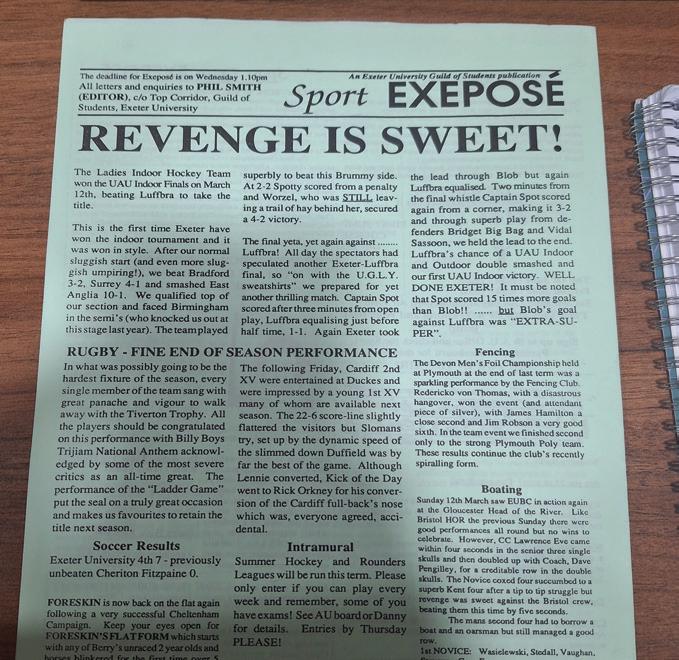
continues to describe a match against Cardiff the ‘Kick of the Day’ went to “Ricky Orkney for his conversion of the Cardiff full-back’s nose which was, everyone agreed, accidental. “

Across
1 Doglike African mammal (5)
4 Sluice — drain (6)
8 Accepted standard (3)
9 Rogue (9)
10 Building furnishings (8)
11 Initial — gins (anagram) (4)
13 Get in touch (with) (6)
15 Stone-excavating site (6)
18 Part of a cricket wicket (4)
19 Upper jaw canine (8)
22 Media star (anagram) — adapt (a book) as a play (9)
23 Brief sleep (3)
24 Sturdy hunting dog (6)
25 Fashion — craze (5)

Down
1 Optimistic (7)
2 Wading heron-like bird (5)
3 SAS basic (anagram) — X-coordinate (geometry) (8)
4 Automatic aircraft pilot (British informal) (6)
5 Very small (4)
6 Previous (7)
7 Narrow (Scottish) mountain valley (4)
12 Area of declining industry (informal) (4,4)
14 Hero of the Arabian Nights (3,4)
16 Forked (1-6)
17 Harp player — sty IRL (anagram) (6)
18 Physical structure (4)
20 Snow leopard (5)
21 Overtake (4)


1. What ocean is Easter Island surrounded by?
2. When was the first Easter egg created?
3. How many pieces of silver DID Judas betray Jesus with?
4. What is Bambi’s rabbit friend called?
5. In Switzerland, what animal delivers Easter eggs to kids?
6. What does a rabbit do when it ‘popcorns’?

SCIENCE EDITORS:
Eloise Shewring
Hannah Woodley
Charlie Gershinson
Livvy Mason-Myhill
ON the 25th February, the adoption of wild elephants was banned in Bangladesh, in the hope that this will bring an end to their exploitation, and help save the species from extinction.
Last May, two elephants were led by Mahouts through Bangladesh’s capital, Dhaka. This is common practice in the region, with elephants often used for begging. However, they were then led along some train tracks, where one elephant was tragically killed by a train. The Mahouts fled with the other animal, disappearing into the forest. This ignited outrage in Bangladesh, shedding light on an issue which has plagued the country for decades.

The adoption of wild elephants was banned in Bangladesh
Bangladesh was once a major home to Asian elephants, but poaching and habitat destruction reduced their numbers to critically endangered, with only 200 remaining, 100 of which are kept in captivity. Previously, the forestry department granted licenses for logging companies as well as circuses to hold elephants in captivity. However, the animals are often treated with immense cruelty, used to drag heavy logs and trained with a method called ‘Hadani,’ where calves are shackled to logs away from their mother and tortured in order to teach them tricks.
Despite protests throughout Bangladesh, there was no change to the elephant licenses, resulting in actress Jaya Ahsan and the People for Animal Welfare (PAW) foundation joining forces to create a petition to end the cruelty. The petition was successful, and on the 25th February the High Court banned the
issuing of licenses to keep captive elephants, a decision which was hailed by animal rights groups across the globe.
Rakibul Haque Emil, the head of PAW stated to the media: “This is a landmark order… in this name
of training elephants, private licenses including circus parties brutally separate elephant calves from their mother, shackle them for months and then torture them to teach tricks... we hope it is the end of Hadani in Bangladesh.”
It’s hoped that the captive elephants can be rehabilitated, following the footsteps of other countries such as Thailand and Nepal, where they can leave a peaceful life in the wild, chain free.
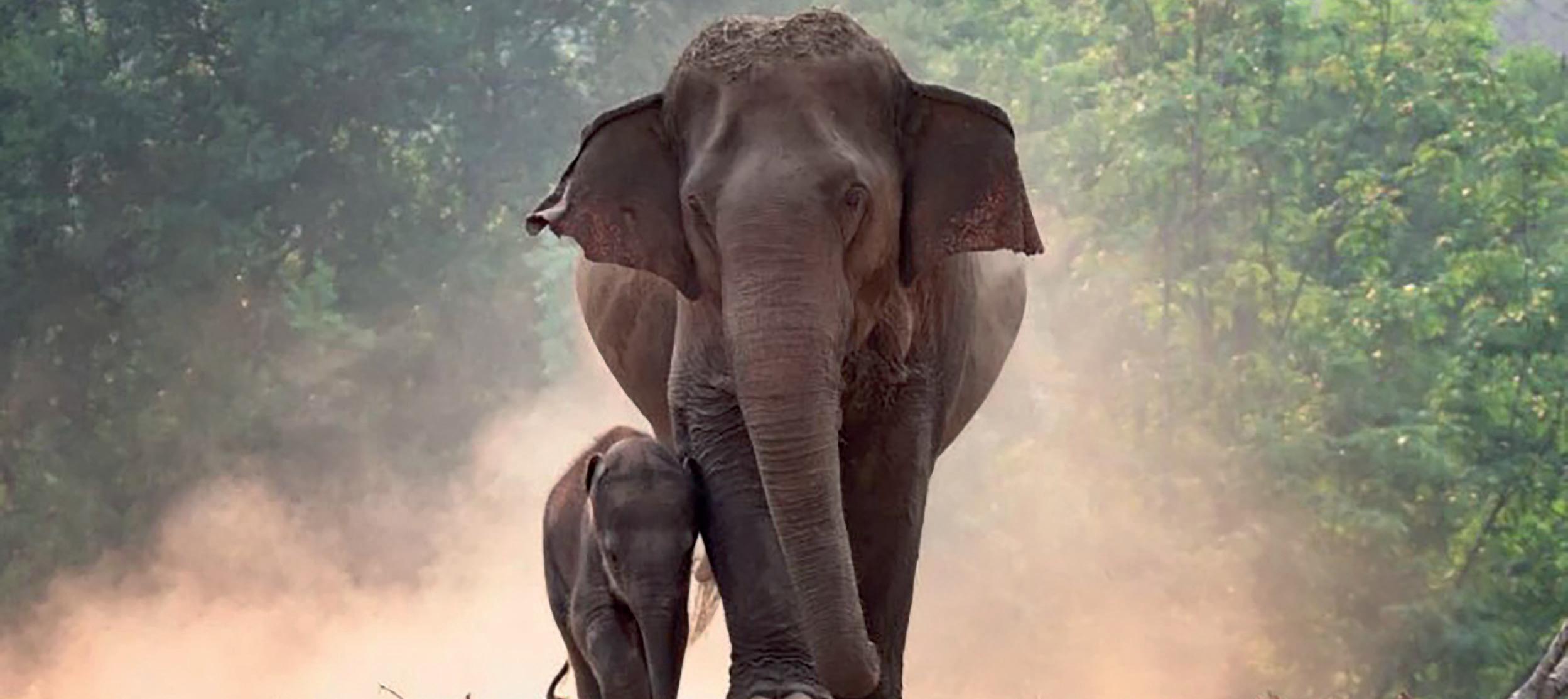
Eloise Grainger, Sport Editor, examines the WWF's recent attempts to draw attention to dangerous algae in the ecosystem
ARECENT report from the wildlife charity, WWF, was halted from publication. The report covered fixing the food system, as the production of food in both the UK and abroad is devastating wildlife and the ecosystem. This is particularly being observed in the River Wye. Some may recognise the location from
the popular Netflix show, Sex Education , where Otis’ house sits atop a hill overlooking the Wye, but if we don’t look through the eyes of the camera lens, we see a different picture.
Thick, deadly algae blooms are destroying the catchment area. Eutrophication is the process of a large presence of excessive nutrients in a body

of water that leads to severe consequences. It poses the challenge of suffocating both fish and plant life in the river, as well as disrupting the food chain in the ecosystem. For instance example, the likes of kingfishers or dippers are unable to catch food, as the fish cannot survive in this algae.

Deadly algae blooms are destroying the catchment area
Nearby poultry farms which are within the river catchment area are quickly being identified as the culprits for this destructive and damaging pattern being observed. Phosphaterich manure from chickens is washed into the rivers nearby and impacts the river systems greatly. Intensive poultry production in Wales supplies large supermarket firms, including Tesco.
The shelving of the report by the WWF has led people to draw connections between the charity and Tesco, as they had a strong partnership between 2018 and 2023. Their relationship aimed to jointly tackle the issue of environmental impacts in the food system. Speculation has
increased, as many believe the report was held back from publication in order to ensure no bad blood between the two organisations was cultivated.
The WWF’s report commented on the River Wye as a case study example of environmental impacts of global food production on wildlife and ecology. However, this farm pollution is closely linked to their former partner Tesco.
Spokespeople from the WWF have been assertive that the decision not to publish the report has no tie to the supermarket chain. After removing the River Wye case study example out of the report, for fear that environmental campaigners would emphasise the connections between Tesco and the WWF, the report was found to not meet the "rigorous standards" the WWF demanded, and this is what caused the report to be pulled.
A Tesco spokesperson confirmed that the brand had no involvement in the report nor the decision to not publish it. They reaffirmed that they worked with the WWF to "protect water quality and biodiversity in the supply chains". However, in May 2023, Natural England noted the worsening condition of the River Wye, and
Tesco has been criticised for "supporting an unsustainable supply chain in the Wye catchment", according to The Guardian . By contributing to the degradation of the environment, it goes against the partnership plans between themselves and the WWF.
Demand always informs production in the food system, and the increase in demand from Tesco has ignited a boom in poultry production. The more livestock present, the more overbearing nutrients are flowing into the river system. Without the situation being managed adequately by Tesco or governments, runoff from the land will continue to reach the River Wye and worsen the landscape within the river basin.
Despite the report not being published, the WWF recognise the gravitas of this situation and the plight of the river condition. They have taken the government to court over failure to act on river pollution. The lack of care for river systems will create knock-on impacts for the whole ecosystem, and despite the report not being published, the impact of intensive poultry farming on the hydrosphere is still significant.
ANEW species of sea slug: Pleurobranchaea Britannica has been discovered off the coast of south-west England, on the research ship Endeavour. Sea slugs are a shell-less mollusc renowned for their beauty and diversity. Reaching only five centimetres
in length many would assume that they are insignificant, but they are actually top predators and vital contributors to the food chain. They are known amongst biologists as an ‘indicator species’, due to their sensitivity towards changes in their climates and thus, highlight the health of
marine ecosystems to researchers and biologists. The discovery of this species of sea slug has shown that it has expanded its habitat radius as a result of rising sea temperatures. This type of sea slug is typically found in Northern Spain, Senegal and the Mediter-

ranean — all of which average higher ocean temperatures than that of the UK.
Ross Bullimore, a researcher at the Centre for the Environment, Fisheries and Aquaculture Science (CEFAS) caught the slug aboard the Endeavour. Whilst initially being elated at the first non-microscopic discovery in a while, the fact that these have been found in English waters is an area of serious concern for marine biologists. This breakthrough simultaneously demonstrated how little we know about our oceans, whilst also highlighting the on-going changes that marine life experience as a result of human input, such as drilling for fossil fuels. Human behaviour has steadily been affecting more and more aspects of marine life in the past few decades, which is dismantling the food chain. Fishes and whales are migrating away from their original habitats in search of cooler waters, and sharks act more aggressively in confusion as a response to the increased temperatures.
The marine life’s natural responses to outside stimulus will affect our habits and way of life. For example, the fishing industry will take a massive financial blow if the desired species no longer live on our shores. In 2021, the UK’s
fishing fleet made a profit of £923 million and provided 6,835 jobs on fishing vessels. This industry could get washed away if sea temperatures continue to rise in this manner. Oceans are vital in the regulation of climates, which produce half of the world’s oxygen and impact weather patterns. As well as this frightening fact, warmer waters absorb less carbon dioxide than cooler waters, causing the harmful gas to stay in the atmosphere for longer damaging our environment further. This year the ‘average daily global sea surface temperature’ beat the 2016 record when the ocean’s temperature reached 20.96c, which is worryingly higher than what it should be for this time of year.

2021... profit of £923 million and provided 6835 jobs
More instances of species migration are to be expected if we do not take serious action against climate change. This includes holding large, corporate companies responsible for their negative impacts on the environment, and to stop expecting average citizens like ourselves to make all of the effort to save our planet.
UNCLARITY and bias surrounding studies into the abortion pill mifepristone has led to its restriction in America, and sparked waves of protest for transparency. Sage Publications, one of the world’s leading independent academic publishers, has recently spoken out about retracting two of its research papers linked to the analysis of the abortion pill. After their papers were cited at a federal court in Texas, it has been investigated and ruled that mifepristone should no longer be available for use. These two studies have now been
proved to contain inaccurate records of data, problems with methodology, and unprecedented assumptions into the effects of the abortion pill. Nature, a similarly influential scientific publishing company, has confronted Sage to investigate the issues surrounding its studies, and express their worry about what else is to be discovered in the future surrounding the study of abortion. This has been further justified by the discovery that Sage’s studies were published by authors previously associated with anti-abortion organisations. A failure to declare this clear conflict
of interest has consequentially left the studies up for criticism and concern. Activists in Texas have shown their frustration about the drug’s restriction, as the enquiry begs the question of what is truly safe to believe.

The enquiry begs to the question of what is truly safe to believe
The 2021 papers had been discovered by pharmaceutical scientist Chris Adkins in 2023, who investigated into
its study that abortions carried out with mifepristone lead to a higher statistic of Emergency Room (ER)visits than surgical abortions, allegedly supported with comparisons into who visited the ER up to 30 days after either form of abortion. However, Adkins has exposed the major flaw that it focuses on visits after induced abortion increasing year-on-year without considering the overall increase of ER visits each year comparatively. It also forgets to consider that ER visits post-abortion are not necessarily signs of complications but could instead be regular check-ups.

Slight bleeding after taking the mifepristone pill, for example, is a normal side effect that might provoke such a visit and is very common among women. Variables such as distance to the ER or personal preference could also affect the choice between pill-induced abortion and surgical abortion, and influence comparative rates. Publication of inaccurate claims had once again been passed by an anti-abortion affiliated journalist, now brought to light for approving biased conclusions. A third study retracted study from Sage, published in 2019, also revealed that almost half of abortion providers received claims of malpractice or complaints, or even faced disciplinary action.

James Studnicki, author of all three papers, is the director of data analytics at an anti-abortion organisation in Arlington and has expressed backlash towards the retractions. His claims that he complied with regulations are going to be held in court as authors will be taking legal action against Sage. The act of retracting his studies has been applauded, however the stigma of abortion and its polarising effects nevertheless continue to be detrimental for American opinion today.
The risk of false claims and misleading information poses an extremely high stake.
PREDICTING the outcome of Exeter City Women’s second designated St James Park fixture of the season, was hardly ever an unsolvable challenge to the Grecian supporters. For those who were previously fortunate to attend the Exwick Sports Hub on numerous occasions and had mindfully followed the Grecian National League campaign the home encounter with an inconsistent Maidenhead side offered limited intrigue in terms of result. As always for a Grecian home game, the common question was how many — how many times will Exeter find back the of the net against a side struggling in mid-table obscurity. However, off the back of a semi-final League Plate defeat to third tier Derby County, aswell as an extended break in the league, the well-rested squad of Abbie Britton and Aaron Wakely strived to put things right at the turf of SJP.
More broadly, the game between Exeter and Maidenhead appeared to be the second chapter of an exciting weekend double header at St James Park (Exeter City men’s game encompassed in the ac-
tion too). With emphasis on the widely celebrated International Women's Day, Exeter City once again partnered with a successful national campaign tackling sexism and discrimination within the beautiful game. Sunday’s game meant the return of an annual occasion and was therefore special. It was all about ‘Her Game Too’!

The
event was treated with immense care and responsibility
Exeter City’s role as the first ever official partner of the ‘Her Game Too’ movement cannot be understated and this was vividly shown in the lead up to the game. Themed colourful matchday programmes, ‘Her Game Too’ labelled jumpers worn proudly throughout the warm up by the Grecians and the Magpies, finally the appearance of Lucy Ford, one of Her Game Too’s founders, on Exeter City’s Official Podcast ‘Park Life’. The event was treated with immense care and responsibility.

IAs for the players, their desire to perform in front of a bumper crowd was immediately visible. In a squad, where individuals balance full time jobs with football, it was an invaluable opportunity to showcase their passion and uncover talent within the squad on the biggest stage in town while highlighting the clubs ongoing progress, development and achievement. Just 24 hours after a late equaliser broke the hearts of Big Bank supporters during Exeter City men’s League 1 encounter against Bolton, the fans in red and white had a second game to attend. At a club that believes in inclusivity and equality, this was a game for the Exeter City family.
The ‘Her Game Too’ jumpers were shoved to the side, as the clock passed 2pm and the grecian girls, now wearing traditional red and white colours, marched at the vulnerable Maidenhead defence. With early chances from various set piece routines setting the stage in front of the Stansfield Stand, the deadlock was broken inside ten minutes. The grecians advanced down the middle like a knife through butter as Jess Sandland floated a ball into the opposition's half. A headed flick on from Jenna Markham played in Sarah Stacey keeping her onside for a rendezvous with Maidenhead’s Wilmott Joyce. A composed finish saw Stacey hit 20 in her season tally.
A few minutes was all it took for Exeter City’s lead to double. Amber Pollock made a run down the left wing and with a beautifully timed ball from Sandland the wing back found a pocket space. Skipping away from two defenders and entering the penalty area, Pollock spotted the unmarked Jenna Markham. A gentle crossball, a comfortable

finish and two for the Grecians, with Amber Pollock's presence in the starting lineup immediately justified. It was the young wingback again providing the creative spark in the later part of the half as she broke down the left with pace and menace. A cross ball to the edge of the penalty area failed to find an Exeter striker, but with limited defending from the Magpies, Baker capitalised from the edge. A spectacular strike from the midfielder rifled into the top corner avoiding the inside of the post caught Joyce by surprise. The keeper stood like a statue, the main stand was brought to life.
Unlike the excellent first half momentum, Exeter City’s lethargic early second half display silenced St James Park supporters. Nevertheless, executive managerial decisions returned the grecians into ascendancy, while the controversial replacement of Stacey for Connie Pengelly ultimately paid off. It was Pengelly herself, who soon became the outstanding performer. A bullet-header with one of the opening touches bounced back into
play from the woodwork, but a majestic free-kick just moments later became Connie’s redemption and saw lift-off at SJP. A late stoppage-time tap in from inside the six-yard box (also by Pengelle) settled the final score. 5-0 to the Grecian women and the young supporters around the park cheered on, inspired by their role models.
Exeter City women dominated again in what became more than a progressive stride towards potential promotion. Full time scenes with hundreds of young fans in the stand interacting with the players through post match autograph and photo sessions, illustrated the game’s key message — we are all a family and Exeter City Women is a family club. The collaboration of Exeter City FC and HerGameToo proved to be a success once more, with the final attendance number reaching two and a half thousand. The Stance against inequality within the beautiful game continued with great support shown to the stoic squad of Grecian girls in what was simply a great day of football.
N 2023, on gameday itself the EUWRFC squad thought they would be playing at Sandy Park for their varsity clash — and then with little notice the chance was snatched away. In 2024 however, EUWRFC got their chance.
On top of that, EUWRFC took that chance with two hands — defeating Edinburgh University 32-19 pulling away in the second half, a strong 22-7 second half performance for the Exeter squad confirming five points in their final game of the regular league season. Exeter jumped off the mark with a greyhound start, prop Alessia Skeates opening the scoring from close range after an early Edinburgh knock-on and subsequent scrum after 60 seconds. Edinburgh responded quickly however to lead 12-5 before a late try by Andie Keyte that gave Exeter hope into the break. Exeter however stamped their authority on the Women’s Na-

tional League tie pulling ahead to lead 32-12 before a late consolation score by the Scots — Richardson, Orchard, Clarke and skipper Brennan running in tries in a strong win that confirmed Exeter as top-seeds in the quarter-finals of the WNL Playoffs second in the league. Exeter will face off at home against Cardiff, and the home team will come into the fixture heavy favourites — 83-0 winners in Devon, 52-12 away winners in Cardiff. Result aside, despite the early midday kickoff a bumper crowd filled the seats at Sandy Park with many young players at local rugby clubs and Chiefs fans young and old getting a glimpse of the squad’s talent. Furthermore, the Chiefs coach-
EURFC took that chance with two hands
es had their keen eye on the game too. The Chiefs Women came out to the turf an hour after the university squad had started celebrating their win — and needed a win after a tricky start to the new year. The Chiefs would come away with this win, 43-7 victors against the Loughborough Lightning — picking up their first win in two games after a 19-all draw at home versus the Harlequins and a seven point loss to Gloucester-Hartpury at Kingsholm. 19-7 leaders at half-time, the Chiefs pulled away in the second half 24-0 stopping any further scores from the East Midlands side — the Chiefs took five points and momentum into the Six Nations international break, and into an Allianz Cup semi-final in North London against Saracens in April. Kanako Kobayashi was the stalwart — the substitute back running in a hat trick with the home side attacking mostly through the front

rowers via Menin, Rogers and Moloney. A day before Mother’s Day and a day after International Women’s Day — the double header was a breath of fresh air in the Exeter sports calendar, and a great step for the premier women’s sport club in the university after unfairly having their trip to Sandy Park taken away from them last year. Two wins
from two women’s sides trailblazing women’s rugby — what else could you want?
AFTER a long anticipated 2024 season, F1 is finally back on our TVs, but is this just same old same old? Déjà vu hit many of us during the opening weekend over in Bahrain, as Max Verstappen took the chequered flag with teammate Sergio Perez behind. The podium was completed with a Spaniard, as was the case at the beginning of 2023, but Carlos Sainz claims the last spot, with fellow Spaniard Fernando Alonso in 9th place after slipping down from a 6th place start. Alonso claimed simulations predicted the Aston Martins to sit around 9th, with the top four teams seeming slightly out of reach.

Contact for an Aston Martin on lap one was seen once again in 2024, with Lance Stroll sent spinning in the first corner after being rear ended by Hülkenburg in the Haas — not the start either driver was wanting for the first Grand Prix.
The 2021 Monaco Grand Prix saw then Mercedes driver Valtteri Bottas set the longest pitstop record, with it taking a whopping 43 hours due
to a stubborn wheel nut refusing to come off, which subsequently ruined his race. Disaster struck once again for the Finnish driver, as the wheel nut on the front left of his C44 car left him stranded in the pit box for 52.4 seconds. Once he got underway again, his race was left destroyed as he brought the car home in 19th.
But we were blessed with some fantastic overtakes, particularly on the opening lap. Lando Norris swooped past Alonso into turn one of lap three, with his teammate Oscar Piastri in close pursuit of the car in front. Quickly after, George Russell made a bold move in his W15 round the outside of Charles Leclerc to pinch second place from the Ferrari. In the end, though, Leclerc did finish ahead of Russell in 4th place. Just a lap later, Piastri makes the same move as his teammate to clear the Aston Martin. At turn 11, car 11 passes Leclerc to position his RB20 in the podium positions. This is encouraging for Perez, who desperately needs to prove his worth alongside Verstappen to retain his seat. A onetwo for the Red Bulls positions them nicely at the beginning of the season and is a warning sign to their competitors that they mean business.


ON qualifying day for the Saudi Grand Prix, the F1 paddock celebrated International Women’s Day. Yet in the context of the ongoing saga regarding Red Bull team principal Christian Horner’s alleged misconduct, those celebrations have never seemed so empty.
Horner denies all accusations, and an independent inquiry last month cleared him of wrongdoing. However, inappropriate messages allegedly sent by Horner were subsequently leaked, and his accuser was suspended by Red Bull. Irrespective of the details of this specific case, it has encapsulated the barriers women continue to face in the sport — as F1 TV presenter Laura Winter has said, “it has not been easy to be a woman working in Formula 1… [but] we are here to stay and we are right where we belong.”
Nonetheless, as the race weekend began, there was another story breaking. With Carlos Sainz out with appendicitis, Ferrari young driver Ollie Bearman was called up to make his F1 début, aged just 18, making him the third-youngest driver in F1 history. With just one hour of practice before heading into qualifying, and despite a lack of experience and expectations, Bearman was just 36 thousandths of a second away from knocking out Lewis Hamilton from Q3. In the race, Bearman looked like a seasoned Ferrari driver, and ended the race 7th — a solid points haul in a début drive where simply not crash-
ing out would have been impressive.

At the front of the field, there were no surprises, as Max Verstappen cruised to another lights-to-flag victory. It was his 9uiiconsecutive win, leading home a Red Bull one-two. Charles Leclerc completed the podium, after qualifying on the front row for the 7th consecutive time. He was in no-man’s-land for much of the race, even describing his own race as “boring”, but was impressive, setting the fastest lap on 43-lap-old hard tyres. Leclerc will hope that Ferrari can bring strong in-season development to take the challenge to Red Bull.
F1 is not in a healthy place at the moment, with unwanted off-track drama overshadowing often dull on-track action. As well as the Horner controversy, news broke ahead of Jeddah that FIA President Mohammed Ben Sulayem was under investigation for alleged race interference, accused of intervening to overturn Fernando Alonso’s penalty at last year’s Saudi Grand Prix. Bearman’s début may have provided something new and exciting on-track for fans to focus on, but as we head to Melbourne for this week’s Australian Grand Prix, the sport has a lot of questions to answer.
Eloise Grainger, Sport Editor, discusses Formula Student and XRacing's Netflix-inspired documentary
MOTORSPORT can be a challenging industry to break into. Hard work, commitment, and persistence is key to building a successful career, both for the athletes, but also for the people behind the scenes. Thanks to marketing and social media, the life of an engineer is more thoroughly documented nowadays than ever before. Rather than being the men and women in the back of the garage, the mechanics and engineers are increasingly recognised and praised for their endeavours.
With the likes of Drive to Survive documenting Formula One’s race seasons since 2019, it has become increasingly popular to provide behind the scenes insight into the foundations of racing. This is exactly what XRacing is striving to achieve — a competitive car, and a dramatic documentary.
Formula Student is ‘Europe’s most established educational engineering competition’, according to the Institu-
tion of Mechanical Engineers. It gives university students the opportunity to utilise their innovative and enterprising skills, with the aim to encourage more people to enter a career in engineering. Students must produce a prototype for a single-seat race car and pitch it to hypothetical manufacturers.
This pulls out key skills including ‘technical analysis, engineering design, and manufacturing skills’ from their learning, but also combines this with ‘presentation skills, project management, and budgeting’. All of this within a tight deadline, no less. After producing the prototype, it will be taken to Silverstone — the legendary home of the British Grand Prix — to compete against hundreds of other student-produced cars from other universities. Formula One Managing Director of Motorsports, Ross Brawn OBE, is the patron for Formula Student — real world experts are heavily involved in student engineers.
XRacing is the University of Exeter’s racing team within Formula Student. The team has been competing for the past decade in Formula Student, but with a shaky season last year, the team is looking to bounce back this time round. The team have recently took to filmmaking alongside this project. XRacing have recently dropped the first episode of a three-part series which shows how the team fund, design and build their car.
Episode one of Surviving to Drive, titled, Turning the Tide, (available on YouTube) recaps the issues that troubled the team last year, and discusses their hope of regaining a fighting strength this year. They also take a ‘Drive to Survive’ approach to their filmmaking.
Sebastian Calvett, Team Principle of XRacing, is overseeing this project as he claims he can see ‘what the team could become’ and the potential the university has to succeed in
this competition. The Netflix-esque documentary features familiar styles, including the interview room with the film slate snapping down, the dramatic music, and the onscreen location subtitles. With the first episode coming to a close as the engine roars to life, it seems hopeful that the team will be better prepared this year and will hopefully be within the top ten.
Last year, time management caused the team to stumble, but already this year, XRacing has made promising progress, which they will push to con-
tinue for the remainder of the season. Engineering and sport are blended beautifully together into motorsports, and these enriching opportunities are likely to catapult students into a career within this sector. By telling their story through the documentary, we see the tensions and effort that goes into this project, but also how rewarding and fulfilling working in this industry can be. Just as Formula Student is a glimpse into the world of sport engineering for students, this documentary is a glimpse into Formula Student for viewers.

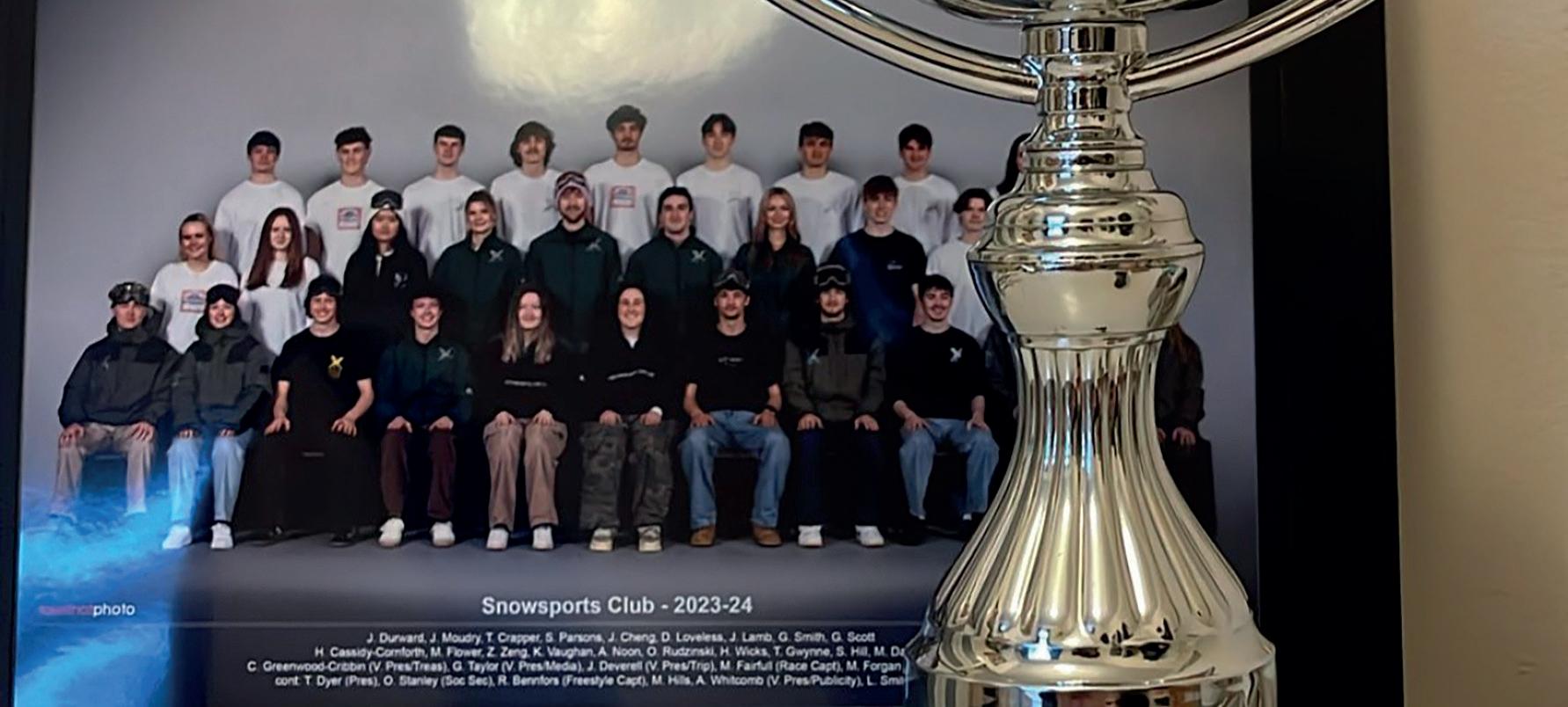
SNOWSPORTS Exeter is known to be one of the biggest party powerhouses at the University, taking thousands of students on Easter ski trips every year, and hosting some of the best nights out in the city — many may be familiar with the recent Chill Hill event on campus! But Snowsports also takes pride in the opportunities they offer to race or participate in freestyling events. Exeter has had an exceptional run in the recent Kings competitions.
Kings is the largest UK Ski and Snowboard racing league. Four regional rounds take place over the winter; Exeter compete in the western region league against the likes of Bristol, UWE and Swansea. Mixed dual slalom, ladies skiing, and snowboarding slalom make up the races. The teams who accumulated the most points at the end of the rounds qualify for finals. Exeter currently sits top of the leaderboard for this region.
I sat down with four members of the Snowsports race team who have recently competed in the ongoing competitions, and they spoke of their time in the club but also of their recent success up on the Gloucester Ski slope.
When speaking with the Freshers’ Rep, Ed Fisher, he described the Kings competitions as “more relaxed” in their structure, with plenty opportunities for both skiing and socialising. This is a more informal structure than would be the case
with other competitions such as BUCS and BUISC. Supporters are also welcome to join the ride as Kings circulates around the region — some competitions have taken place in Cardiff, Pembury, and Plymouth. This style of competition is suitable for keen skiers, first-timers, or simply music lovers alike, as a festival vibe permeates throughout the competition with DJs providing a soundtrack to the races.
Kings is also unique in that anyone with any ski ability can take part in the competitions. During the interview, it was interesting to find out that there is a real variety in the amount of prior skiing or racing experience that team members have. Ben Hummel, third year ski racer, was previously racing before joining Exeter. Race captain, Max Fairfull, was also a seasoned ski racer too, having competed in national competitions. Fisher was already accustomed to dry slope racing, which is what Kings involves. Katie Vaughan, second year ski racer, was new to dry slope and competitive skiing, having only experienced skiing as a recreational activity on holiday. Vaughan stated that training frequently at Exeter Clifton Dry Ski slope has “transformed [her] technique into a more racer style than recreational.” Both novices and well-seasoned skiers have the potential to excel
at Exeter — Vaughan is a core piece of the women’s first team, despite not having raced or been on a dry slope prior to joining university, and races alongside the likes of Fisher, Fairfull and Hummel.

Both novices and wellseasoned skiers have the potential to excel at
Snowsports Exeter is clearly looking incredibly strong. When asked what they think they can attribute this strength to, Fisher remarked that “previous experience

is definitely a contributing factor” but not the entire part of the story. He continues: “Snowsports has provided an environment for people like Katie [Vaughan] to improve.” Fairfull is proud of the team as “all the work had paid off” in training, as Exeter won Round two at the Gloucester Ski and Snowboarding Centre, taking back plenty of celebratory champagne on the coach ride back down the M5. The team has such a number of competitive, strong, and reliable racers that the first and second team are constantly in flux, states Hummel, and that gives many racers the chance to represent Exeter’s best. Exeter’s second team often outperform other university’s first teams. Snowsports Exeter really encourages inter-university relationships. With the likes of Chill Hill and Kings competitions, it allows for many regional universities to have fun together and meet like-minded people. There is also a strong bond between year groups within Exeter’s race team, as many events in the city or posttraining get-togethers combine freshers and fourth years, creating a really inclusive and diverse environment. Exeter stands out for its commitment to inclusivity: as of this year, adaptive ski training takes place every Friday at the dry ski slope, and this has been facilitated
largely by the Welfare Secretary. It ensures people of all abilities are welcomed into a safe environment to get involved with extreme sports, and all equipment, such as sit skis, are included. The committee this year have gone above and beyond to ensure everyone feels included and heard. Fisher noted that Exeter gets involved “in every university Snowsports event that’s available”, and Fairfull described the uniqueness of events such as Chill Hill, highlighting the ample opportunities Exeter provides for students, which triumphs in comparison to other ski clubs around the country.
Vaughan reminisced of the incredible feeling of crossing the finish line of her first King’s competition of this academic year back in October, where this year’s intake of freshers cheered on the team. She claimed, “it was such a lovely experience as it showed how close we had become already and… the race teams [are] closer than ever.”
Exeter came first in the Western League Mixed Ski, with both the 1st and 2nd team qualifying for the finals. This came after the 1st team finished 2nd at Plymouth and the Exeter 2s finished 3rd in the round on 2nd March.
There is a real camaraderie within this team. Spectators are incredibly supportive. Welfare and inclusivity are prioritised. Potentials are maximised. It’s no wonder Snowsports Exeter have had huge successes recently. It is refreshing to see that anyone with any ability can take part, and this mix of friendship and skills seem to be the perfect recipe for success.